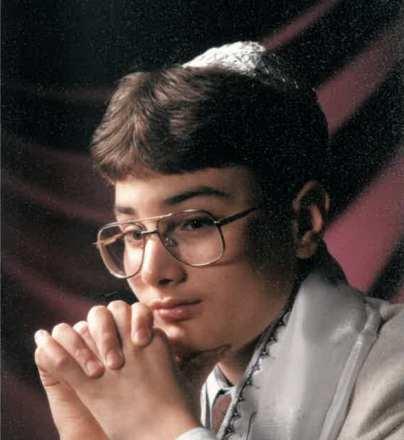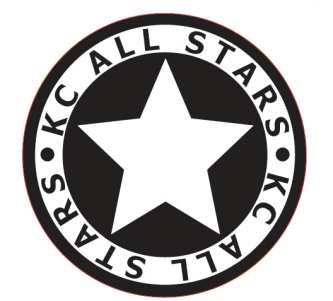
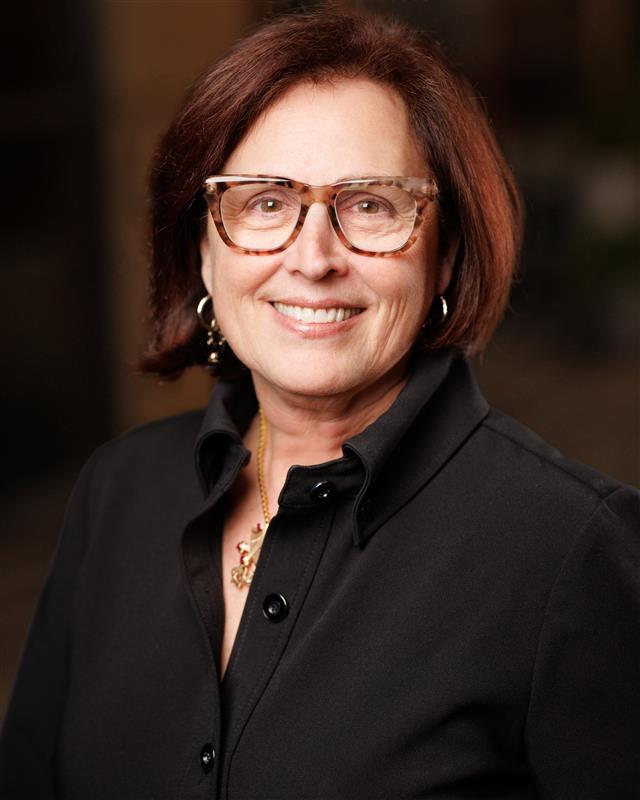







By Sam Kricsfeld Editor
A mohel — one who is trained in the ritual circumcision, or brit milah, of a Jewish baby boy — is hard to come by in the Midwest. With very few in Kansas City, getting a mohel after a boy is born can be difficult for Jewish families. Dr. Tiffany Simpson, Kansas City’s newest trained mohel, hopes to help. Performing a brit milah requires more than just medical training. While many doctors are trained in circumcision and do so to non-Jewish boys, the ritual and spiritual aspects of a brit milah require additional education.
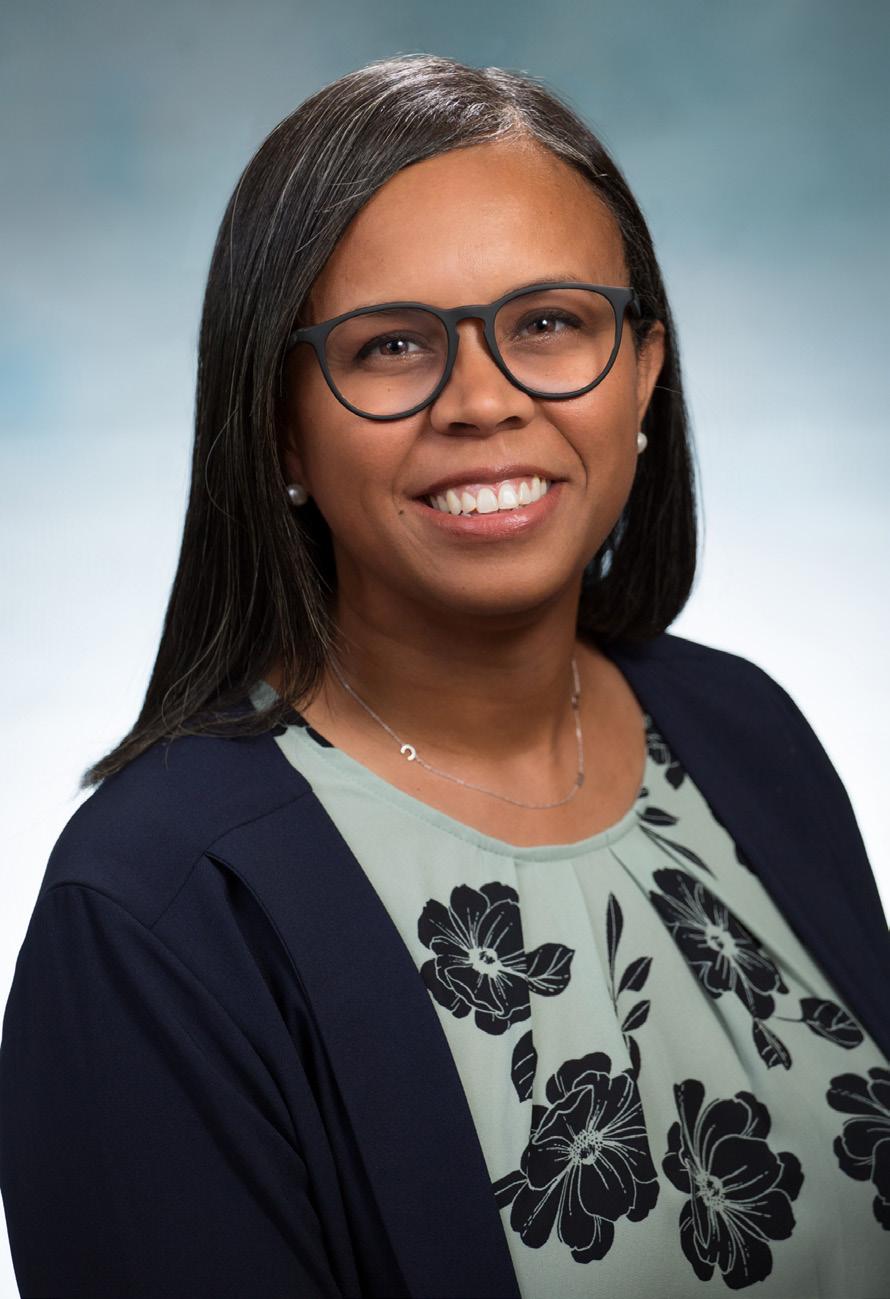
fied, only two mohels were practicing locally — Dr. Daniel Gershon and Rabbi Schneur Perman. This short list of available mohels occasionally results in families bringing one in from another city. The addition of Dr. Simpson to the list helps mitigate this problem.
“I am thrilled that we now have another highly trained and skilled mohel to call upon within the Jewish community in Kansas City,” said Rabbi Stephanie Kramer, senior rabbi of The Temple, Congregation B’nai Jehudah, who encouraged Dr. Simpson to train
By The Chronicle staff

Rabbi Lawrence “Larry” Karol, leader of Topeka’s Temple Beth Sholom for more than two decades, died on July 5 at age 70.
Before Dr. Simpson became certi-
See page 2
By Jane Martin Special to The Chronicle
Upon first meeting Rachel Kricsfeld, it’s easy to understand how she earned a coveted spot on KU’s Baby Jay mascot team. The recent KU graduate – who stands at 4 feet, 11 inches tall – had to keep her Baby Jay identity a secret for the three years she was on the team. In the midst of her work as a KU mascot, she was also active in Jewish student life. Kricsfeld graduated in May and earned degrees in both Jewish studies and visual arts.
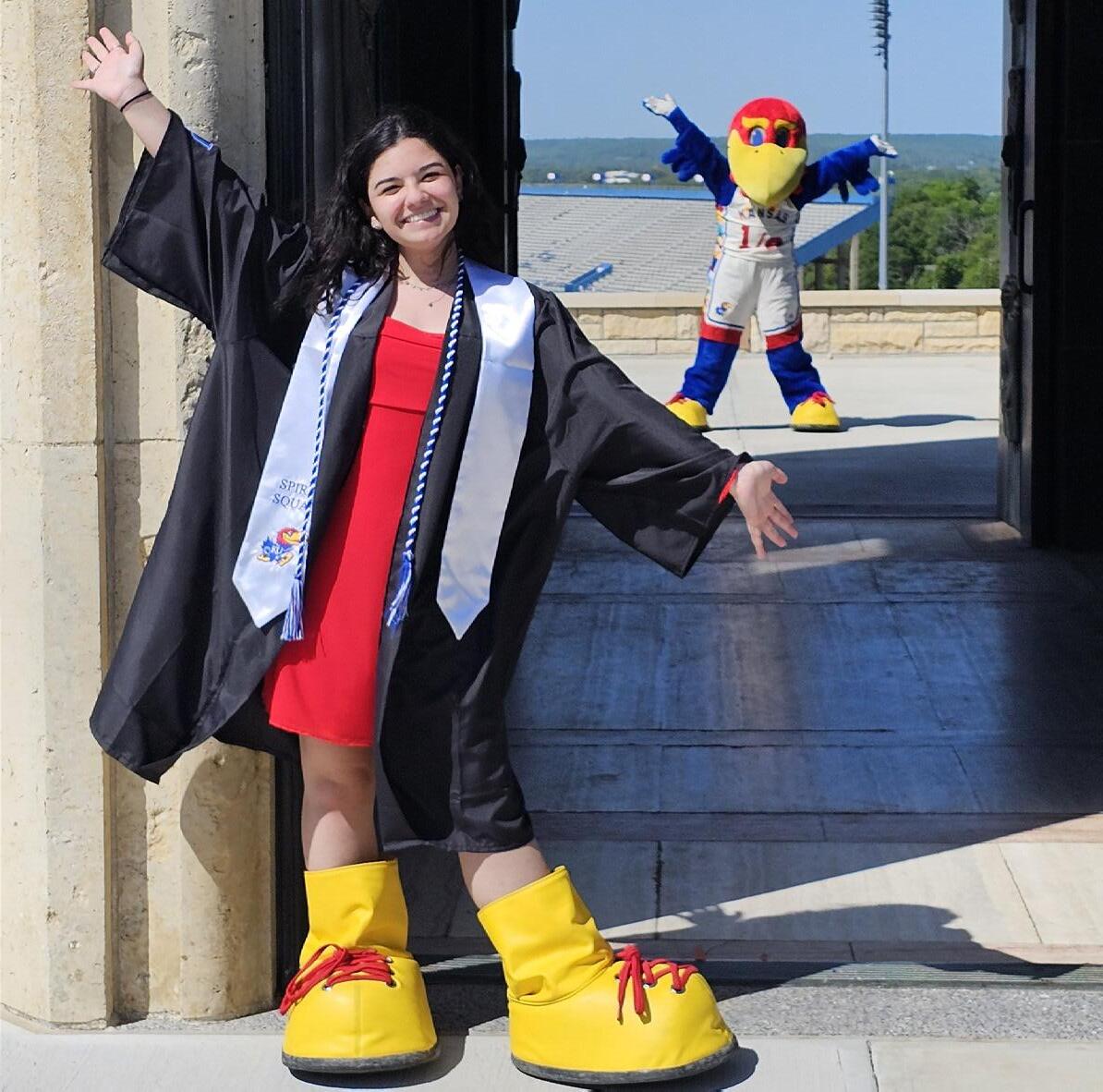
Being under 5 feet tall and starting school as a dance major made Kricsfeld perfect for the role of KU’s Baby Jay mascot, which she did her sophomore, junior and senior years of college. One of five members of the Baby Jay team, she committed to a practice and games schedule of approximately 10-12 hours per week, depending on the time of year.
With five Baby Jay mascots (and five Big Jay mascots), the goal was for each mascot to move and act just like each other to keep the integrity of the character they were playing, thus, the secrecy. Baby Jay, though canonically three years old, actually was introduced in 1971.
Born and raised in Kansas City, Missouri, he was an active member at The Temple, Congregation B’nai Jehudah. After graduating from the University of Illinois in Champaign-Urbana, he was ordained at Hebrew Union College-Jewish Institute of Religion in Cincinnati, Ohio, and served as an assistant rabbi at a synagogue in Dayton, Ohio.
In 1984, he began his 22-year tenure at Temple Beth Sholom, the only synagogue in Topeka. He led the synagogue as the sole full-time clergy member — when he left the synagogue in 2006, a congregant told The Chronicle that he was the only rabbi many of the congregants had ever known.
“Rabbi Karol served our congregation with dedication, wisdom and song,” said Rabbi Sam Stern, Beth Sholom’s current rabbi. “His leadership shaped the spiritual life of Temple Beth Sholom and Topeka for over two decades, and his legacy continues to live in the prayers we sing, the values we uphold and the community he helped nurture from inside our synagogue and far outside our walls as well.”
Rabbi Karol also reassured his congregation after protests from Topeka’s Westboro Baptist Church, which
Kricsfeld
continued from page 1
as a mohel. “Having another doctor in town to assist with circumcisions is a tremendous asset to our community.”
Dr. Simpson, a member of B’nai Jehudah and Congregation Beth Torah, grew up in St. Louis and Kansas City. She graduated from the University of Missouri-Kansas City medical program in 2002 and has practiced neonatology for 16 years. Her experience in medical circumcision led to an emergency room doctor approaching her to train him on how to do the procedure.
Being asked to train a new doctor reminded her of how she’d heard that the Jewish community was looking for another mohel after Dr. Michael Blum retired.
“I started hearing rumblings that we needed [another mohel] in the community,” Dr. Simpson said. “I heard people talking about it, but it didn’t really occur to me to offer to do it until someone asked me to train them.”
Learning that some families fly mohels in from other cities was another impetus for Dr. Simpson to begin her training.
“I can’t say that I had an aspiration to be a mohel, but I felt badly that the community didn’t have what they needed… that we’re flying people in,” she said. “That just seems kind of silly to me, seeing as I know how to do circumcisions. So I thought that I should jump in, see if I could help.”
Dr. Simpson approached Rabbi Kramer to take the next steps in becoming a mohel. Because of her experience doing circumcisions, Dr. Simpson’s training focused on the religious and ritual aspects of a brit milah. Through the Brit
Milah Program of Reform Judaism affiliated with the Hebrew Union College (HUC) and Union for Reform Judaism, she took a 12-week course for medical practitioners. Her training was funded by a grant from the Menorah Women’s Foundation at the Jewish Community Foundation.
Technically, Dr. Simpson is a mohelet, the female word for mohel. In Conservative and Reform Judaism, mohelets are becoming more common. Dr. Simpson is the first mohelet in Kansas City.
From a secular medical perspective, circumcision is not always necessary, but in Judaism, the brit milah is of utmost importance as a covenant between the Jewish people and G-d — a fact “hammered home” in Dr. Simpson’s training. In Bereshit 17:10-13, the covenant between G-d and Abraham and his descendents is that every male be circumcised, “Thus shall [G-d’s] covenant be marked in your flesh as an everlasting pact.”
In traditional circumstances, a brit milah has set prayers and rituals that are well defined — “traditional circumstances” meaning a brit milah for an eight-day-old healthy baby born to a Jewish mother. But Dr. Simpson
learned there are many nuances and changes depending on the situation of the family, such as if the baby was adopted, born to an interfaith family or born to a non-Jewish surrogate mother.
“It makes the service a bit different. You still do [a brit milah], but it requires a different set of prayers,” she said. “[I want to] make sure that I do the service correctly… and also respect the complexity of what’s going on in the family.”
Dr. Simpson made clear that if she is approached as a mohel, she “needs to adhere to the Jewish rules and expectations around the ceremony.” She wouldn’t do a brit milah before the baby is eight days old, for example, or if the family is not Jewish.
She also said that if she were available, she would consider traveling to perform a brit milah, but her intent is to be of service to the Kansas City Jewish community.
Dr. Simpson is thankful for the encouragement of Rabbi Kramer and Rabbi Mark Cooper, who led the training course “and worked diligently to ensure my success,” she said.
Dr. Simpson can be contacted regarding her brit milah services at kcmohelet@gmail.com.




continued from page 1
in 1994 picketed Beth Sholom with a sign that called him a homophobic slur and put a black swastika by his name. Shrugging it off, he told The Chronicle that “The swastika said nothing about me, but rather it reflected the boundless hatred of those who put the swastika on the sign.”

After leaving Beth Sholom, Rabbi Karol served as a rabbi in New Hampshire and then New Mexico before retiring in 2020 and moving back to the Kansas City area in 2021. He had since been active at B’nai Jehudah, teaching at its religious school and providing music and education to congregants.
“After his long, successful career in
the rabbinate, serving many Jewish communities with grace, compassion and dedication, we were fortunate to have Rabbi Karol return to our community in his retirement,” a B’nai Jehudah email statement read. “...A treasured presence in our B’nai Jehudah family, his loss will be felt by
so very many.”
“More than his deep well of Torah, his beautiful compositions and his soulful melodies, Rabbi Karol was the menschiest mensch — always eager to connect, always full of heart. It has been a true blessing to have him at B’nai Jehudah since his retirement. We are all mourning together,” B’nai Jehudah’s Rabbi Stephanie Kramer said.
In addition to leading congregations, Rabbi Karol was known for his musicianship. He released three albums of Jewish music — “Two are Better Than One” (2003), “A New Beginning” (2005) and “The Road Ahead” (2014) — as well as an original songbook, “One Light Above: The Larry Karol Songbook.”
He told the Dover (New Hampshire) Community News in 2006 that songwriting and singing have “really given me extra avenue of expression… My music is about hope, faith, community and creating understanding between religious groups.” The Las Cruces (New Mexico) Sun-News said that Rabbi Karol’s work garnered comparisons to Paul McCartney, Elton John and Cat Stevens. His music is available on streaming services and on his website, larrykarol.com.
Rabbi Karol is survived by his wife, Rhonda; son, Adam; brother, Rabbi Stephen Karol; and two grandchildren. Funeral services were held at B’nai Jehudah on Wednesday, July 9, followed by burial at Rose Hill Cemetery. In lieu of flowers, the family requests donations be made to The Temple, Congregation B’nai Jehudah.
Rabbi Karol’s obituary can be found on page 13.

Barbara Bloch, a native Kansas Citian and Jewish community member, has been hired as Jewish Federation of Greater Kansas City’s major gifts officer. She began in this newly-created role on June 1.
Bloch has a long history with Federation. She served on its board for eight years, chairing its allocations committee for two years and serving as secretary for another two.
"Jewish Federation leadership could not be more excited about having Barb Bloch as part of the professional team," said Derek Gale, vice president and chief operating officer. "Barb served Federation well as a board member and brings both many years of strong fundraising experience and amazing connections and relationships to her role. We are confident she will help us continue to grow investment into our community from generous community members as well as local businesses.”
Bloch’s years of involvement solidified her enthusiasm for and support of Federation’s mission.
“With the money that we raise, we continue to do positive, important work,” she said “… There’s a lot of good we do in the community, and if donors knew what all aspects Federation touches, I think it would compel them to get more involved.”

Bloch is the daughter of the late Archie and Marjorie Bercu. She became involved with the Jewish community at a young age, joining BBYO. She has extensive knowledge of the fashion industry, having studied textiles and apparel management at the University of Missouri and running multiple businesses in the field.

In a profile in the Nov. 9, 1984, issue of The Chronicle about Bloch and her design company, The Cotton Duck, she was described as a “one-woman dynamo” and a “designer, pattern maker, manufacturer, sales representative — Barbara [Bloch] has learned how to manage it all.”
Later in her career, Bloch’s fashion endeavors included working as a recruiter for a clothing line, Carlisle Collection, serving three terms as regional director for the Fashion Group and running a consignment store, Her Majesty’s Closet. Her interest in philanthropy stemmed from a recurring theme she noticed among famous fashion designers.
“All the big name designers have
foundations, and they all have their passions, and they all give back,” Bloch said.
She married Robert Bloch in 2005, and through his family came another influence on her philanthropic philosophy: her father-in-law, Henry Bloch, cofounder of H&R Block.
“Take a look at what my father-inlaw did… giving back to a community that gifted him success,” she said. “He also helped guide my moral compass. He was always out in the community trying to do as much as possible to give back to the community that made him a success.”
Now settled into her new position, Bloch can be reached at barbarab@ jewishkc.org for questions regarding making a gift to Federation.
“I’m excited to bring new opportunities to the community and looking forward to Federation’s vision of a more inclusive community that touches so many areas,” she said. Take a look inside Village Shalom to see our remarkable Long Term Care community. Private suites and the finest in comprehensive skilled nursing services give peace of mind to you and your loved ones.

Learn more at VillageShalom.org or call Lori Carter, Admissions Coordinator, at 913-266-8473 to tour our welcoming senior living community. We look forward to showing you what peace of mind looks like. Welcome to The Village.

Six Jewish comedy stars, ranging from Tik-Tok trendsetters to TV actors, are scheduled to appear in the Kansas City area over the next few months.
Phil Rosenthal
Aug. 16, Uptown Theater
appearances on TV shows such as The Today Show and The Tonight Show; hosting his “JTrain Podcast;” and his Netflix comedy special, “Jared Freid: 37 & Single.”
ed on social media that his DNA test revealed him to be 99.4% Ashkenazi Jewish.
Gianmarco Soresi
Nov. 21, KC Funny Bone
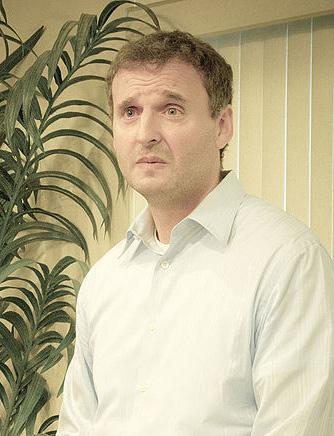
Though not a comedian, Phil Rosenthal has extensive experience in comedy as the creator and executive producer of the sitcom “Everybody Loves Raymond” and star of the travel show “Somebody Feed Phil.” The 65-year-old creator is the son of German Holocaust survivors.
Rosenthal will be appearing at the Uptown Theater in Kansas City, Missouri, at 7 p.m. on Saturday, Aug. 16, for a moderated discussion about his travels, TV career, friends and family. More information is available at uptowntheater.com.
Jared Freid
Sept. 19-20, KC Funny Bone
Freid will perform two shows each on Friday, Sept. 19, and Saturday, Sept. 20, at the Kansas City Funny Bone. More information is available at kc.funnybone.com.
Oct. 10-11, KC Funny Bone
Adam Ray is a 42-year-old comedian known for his YouTube videos, TV and movie appearances and his parody impressions of Phil McGraw (“Dr. Phil”).

Ray will perform on Oct. 10 and 11 at the Kansas City Funny Bone. More information is available at kc.funnybone.com.
Ben Schwartz
Schwartz will perform at 8 p.m. on Friday, Oct. 24, at The Midland Theatre. More information is available at midlandkc.com/events/detail/942712.
Hofstetter
Oct. 30, KC Funny Bone
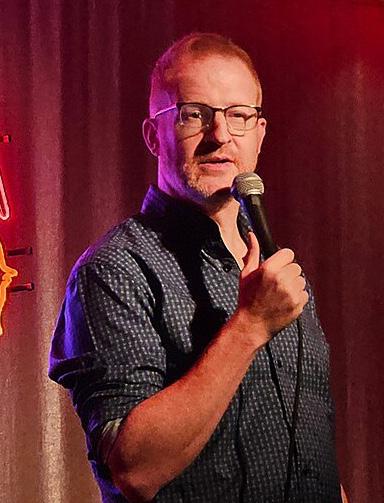
Steve Hofstetter is a 45-year-old New York-born comedian known for his audience interactions. He’s released various comedy albums and five books. Hofstetter is also known for his sports knowledge, having been featured on ESPN and the MLB Network.
Hofstetter will perform at 7 p.m. on Thursday, Oct. 30, at the Kansas City Funny Bone. More information is available at stevehofstetter.com/ calendar.cfm.
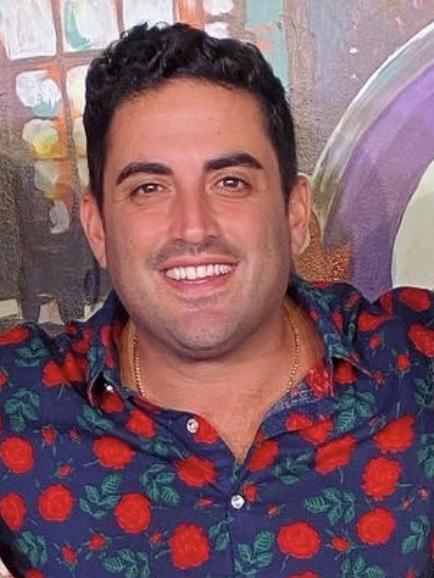
Massachusettsborn comedian Jared Freid made his name in New York City comedy clubs. Freid is bestknown for hosting a game show, “How Low Will You Go: Snapchat;”

Oct. 24, The Midland Theatre Actor and comedian Ben Schwartz is best-known for his recurring role as “Jean-Ralphio Saperstein” on the sitcom “Parks and Recreation.” Never hiding his Jewishness, he once post-
This summer, Jewish Family Services (JFS) is hosting Neighbor Market events at its Brookside location to make it easier for those in need to drop by for free food and other items.
Partnering with AdventHealth and Harvesters, JFS will host three additional dropby markets at its Brookside location on Fridays, July 18, Aug. 1 and Aug. 15 from 1 to 2 p.m. or until supplies
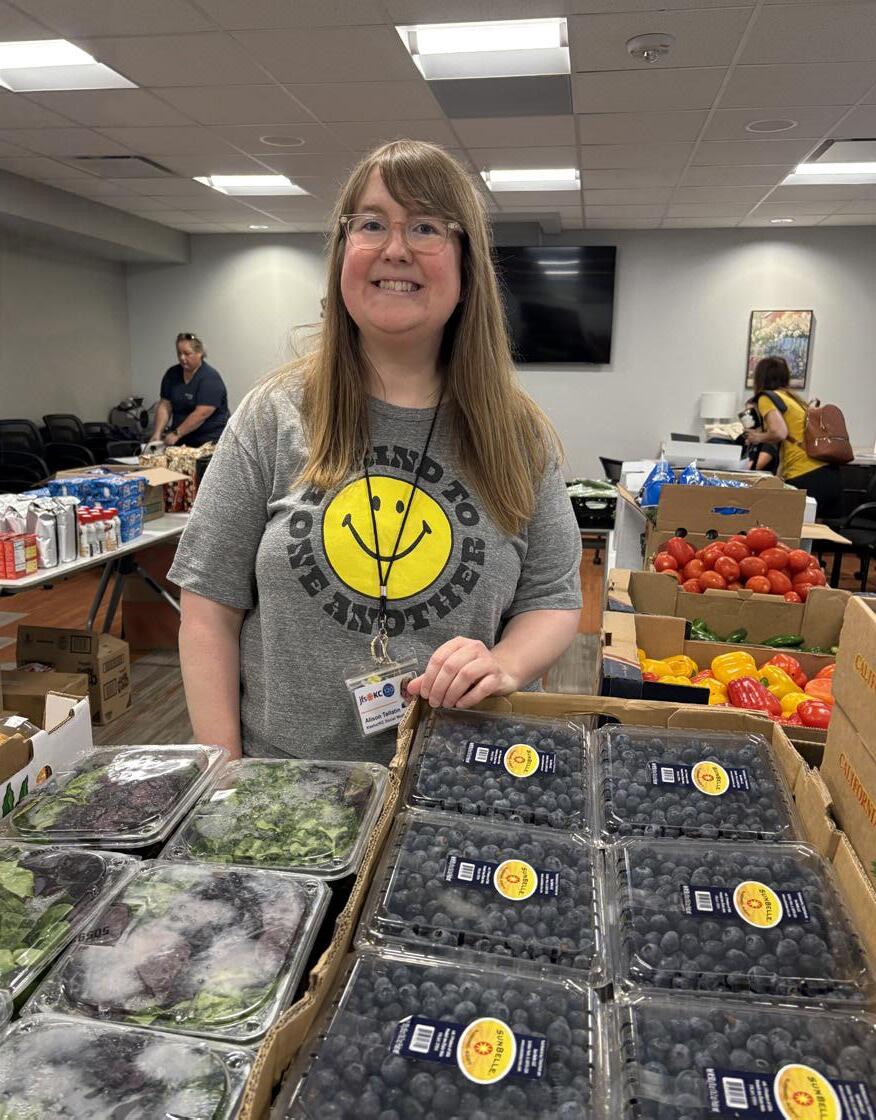
KesherKC Social Worker
Alison Tellatin helped set up blueberries at the June 20 market, which was held indoors due to excessive heat.
run out. Inventory will change with each market.
Neighbor Market opportunities are intended for those facing food challenges, regardless of faith, age, culture or identity. More information about the Neighbor Markets is available at jfskc.org.

Gianmarco Soresi, born to a Jewish mother and Italian father, is known for his stand-up comedy, podcast and social media clips of audience interactions at his shows. After a Netflix comedy special appearance, The New York Times called him “a Jewish comic who alternates between silkily feline physicality and frenetic gesticulation."
Soresi will perform two shows each on Friday, Nov. 21, and Saturday, Nov. 22, at the Kansas City Funny Bone. More information is available at gianmarcosoresi.com/tour.
(Photo credits to Louise Palanker, Willthacheerleader18, We Might Be Drunk Podcast, Our Movie Guide and Albin Olsson, respectively, of Wikimedia Commons)



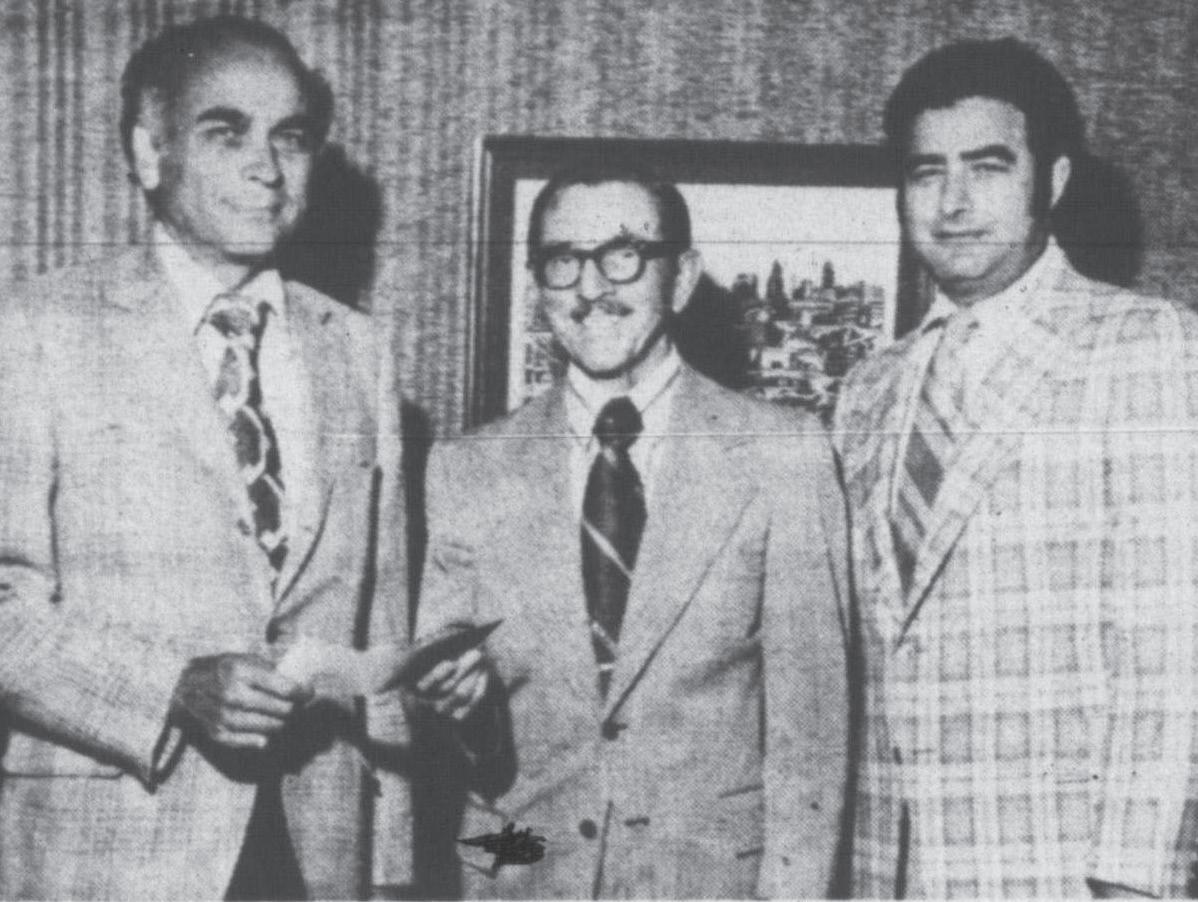
and Myron Schultz, president and chairman (right), presenting a check to Sherman Dreiseszun (left) for $20,000 of Israel Bonds.

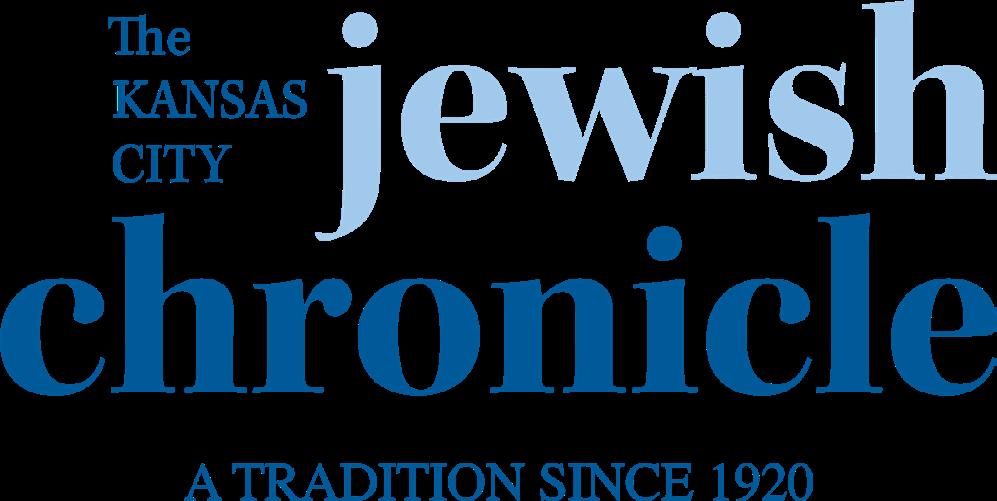

DRTIFFANYSIMPSON BABYJAY
• Baby Jay (pg. 1)
• JVS grant (pg. 8)
RACHELKRICSFELD BARBARABLOCH COMEDY NEIGHBORHOODMARKET JVSGRANT PAPERAMULET CREATINGCOMMUNITY
• Barbara Bloch (pg. 4)
• Brit Milah (pg. 1)
• Mohel (pg. 1)
AIRPORTCHAPELS MOHEL BRITMILAH TOOHOTTOHANDLE
• Comedy (pg. 5)
• Creating community (pg. 10)
• Dr. Tiffany Simpson (pg. 1)
• Neighborhood Market (pg. 5)
• Paper amulet (pg. 8)
• Rachel Kricsfeld (pg. 1)

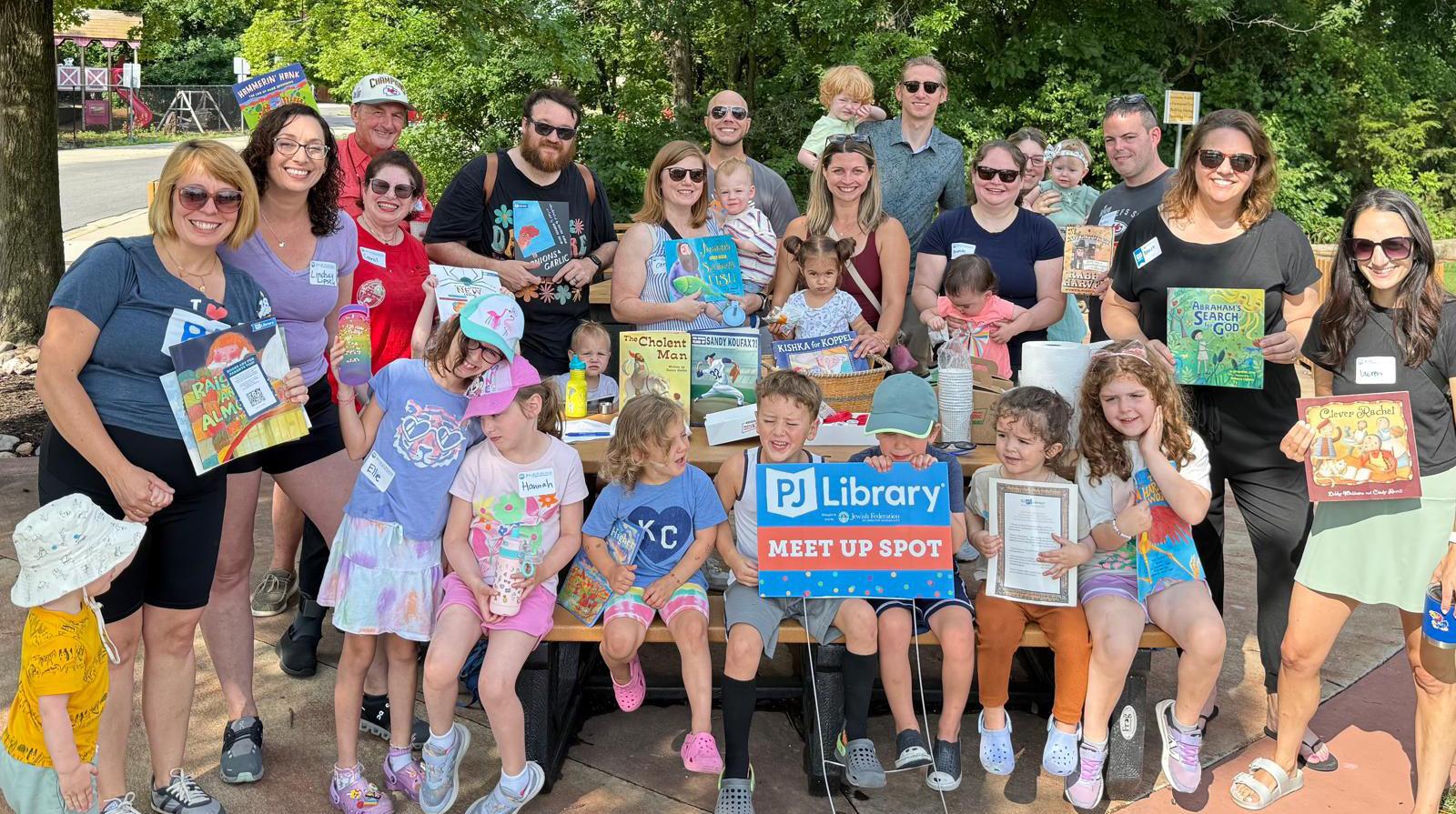
PJ Library of Kansas City hosted two PJ in the Neighborhood events on June 29. Families in the Northland met up at Dagg Park Splashpad (top), and families in southern Johnson County got together at Deanna Rose Farmstead.
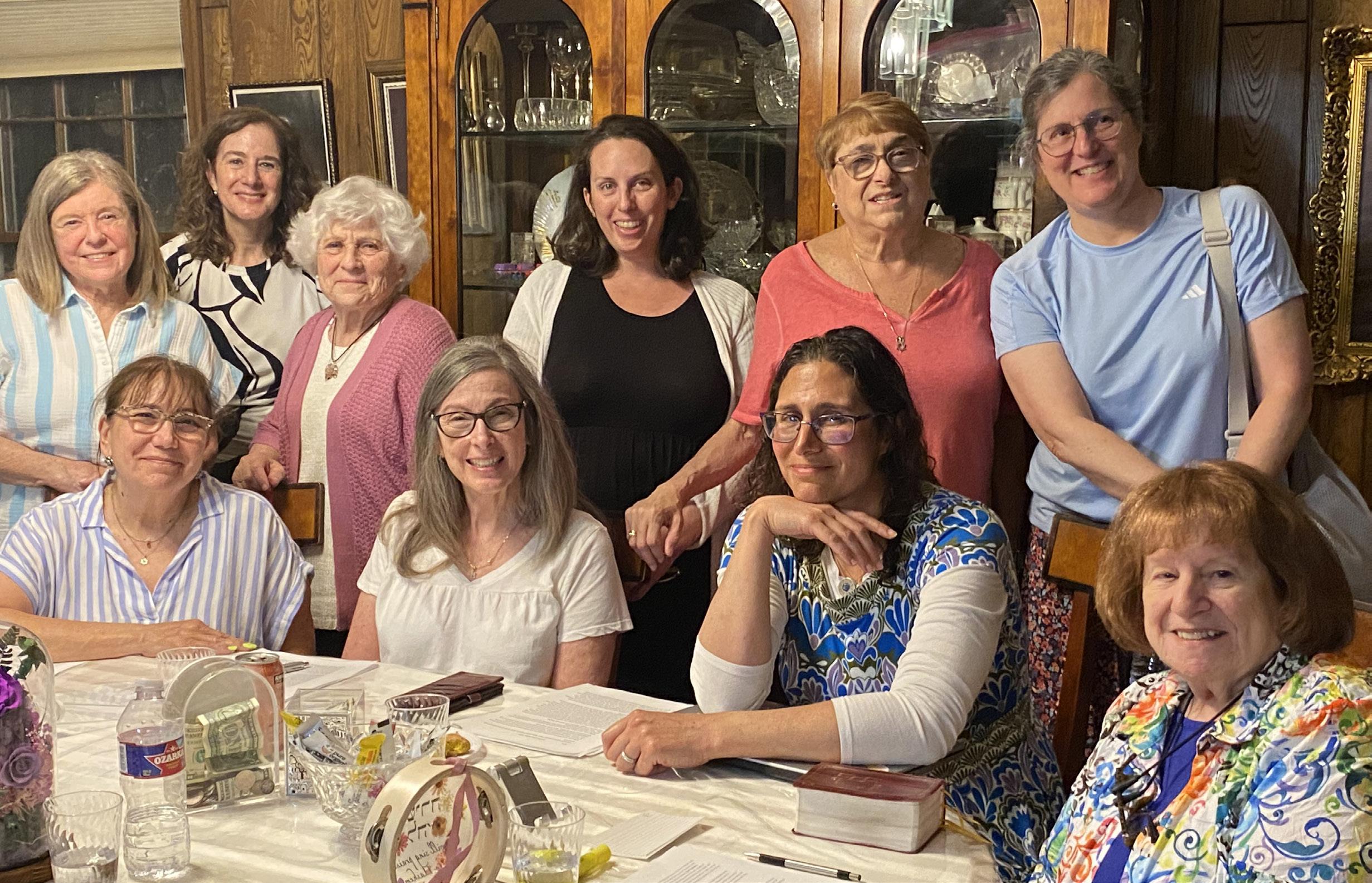
The Simcha Gifts committee recently met to begin planning for the coming year. Pictured are (back row, left to right) Jean Zeldin, Dini Freed, Susan Erenberg, Jenny Gavra, Marsie Bornstein, Erica Bush, (front row) Diana Bright, Roberta Goller, Rebecca Friedman and Barbara Frager. Not pictured are Pam Reiz and Blumah Wineberg.


Members of Jewish Federation’s Young Adults Division (YAD) met up at Gezer Park in Leawood for an Impact Event about Israel. The evening included a tour of the park led by Leawood’s Gezer Region Sister City Committee Chair Stacey Belzer. Pictured are (standing row, from left) Henri Gaeddert, Yair Friedman, Mika Kislanski, Mollie Berenbom, Jay Ingber, Jack Schreiber, Carrie Ingber, Ben Novorr, Zac Bogen, Raphi and Sarah Schuster, Federation President and CEO Jay Lewis, Logan Cole, Margo Hellman, Taly Friedman, Sam Kricsfeld, Rachel Kricsfeld, Gregory Bortnick, Kaitlin Birnbaum, Stacey Belzer; (front row, sitting) Sarah Markowitz Schreiber, Dani Thompson, Sam Passer, Matt Bayer, Lauren Ruben, Grace Dorman, Sarah Navran and Sierra Debrow.
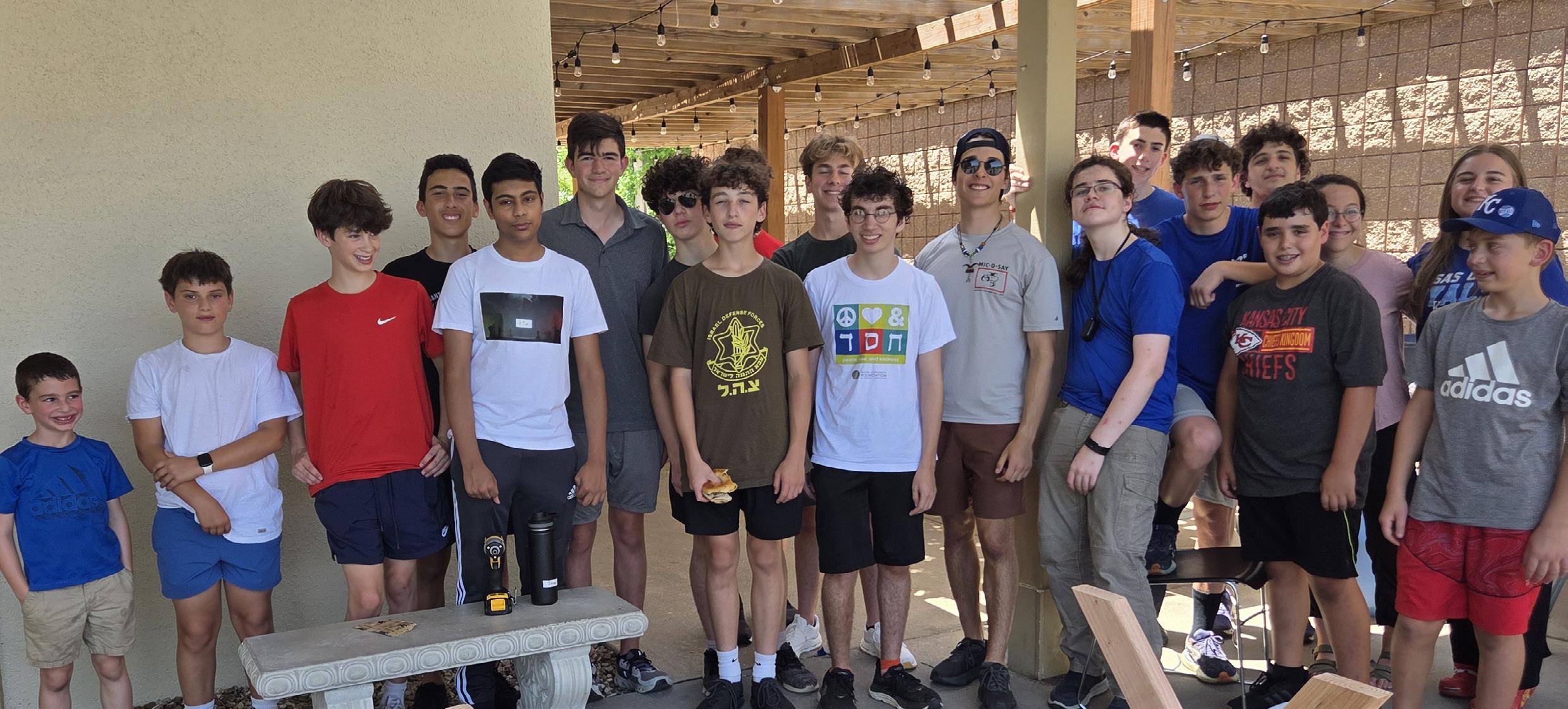
Ezra Jacobs from Scout Troop 61 recently completed his Eagle Project at Congregation BIAV, building four picnic tables for the congregation to use. Jacobs (center) is

Congregation Beth Torah's confirmation students celebrated their completion of the Weiner Religious School program with a special Confirmation Campout on July 5 and 6 at the Zwibelman family farm. Attendees included Jack Bowen, Rex Hebberd, Shaefer Spizman, Quentin Standridge, and chaperones Sara Glass, Weiner Religious School director, and Beth Torah Co-President Zach Zwibelman.
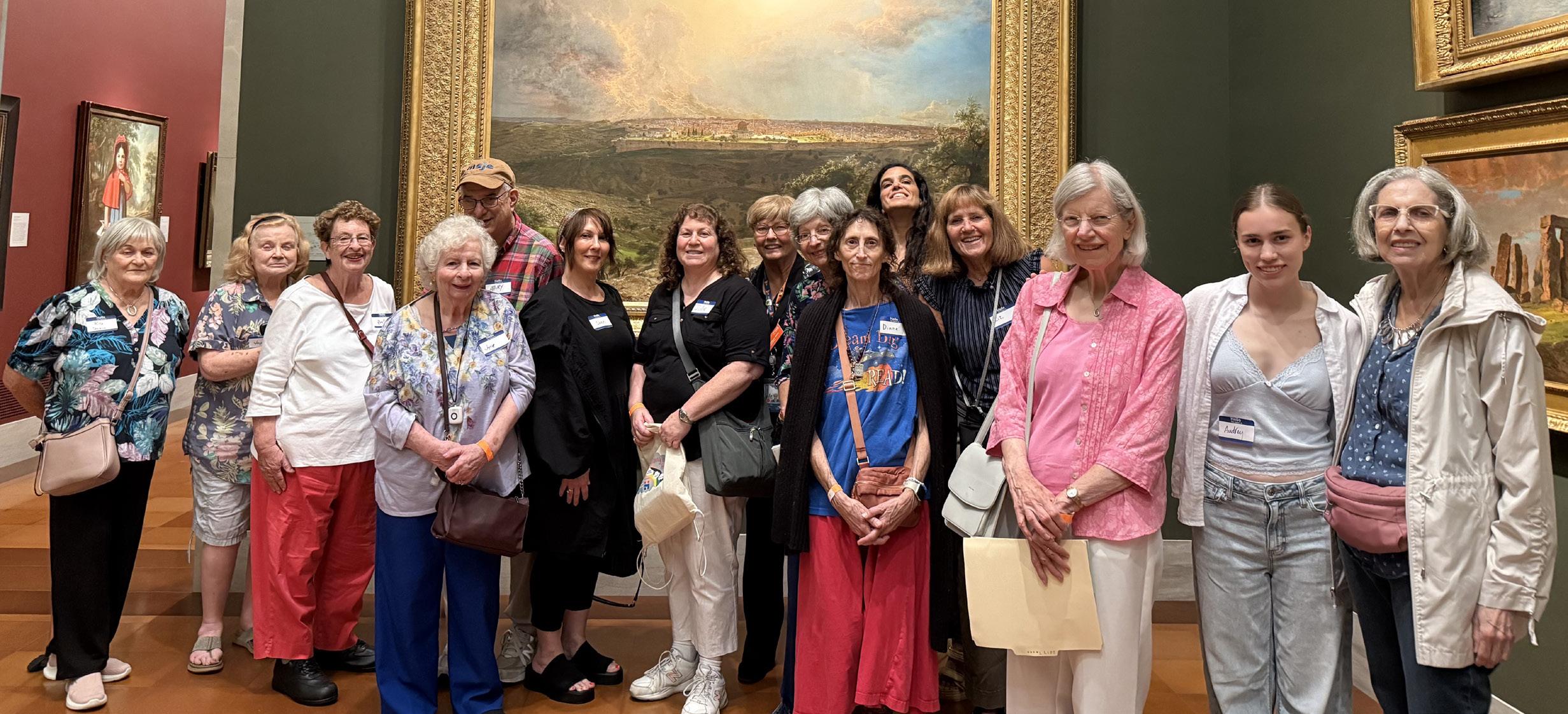
Kansas City’s Jewish community has been home to many Holocaust survivors over the years, and Jewish Family Services (JFS) has supported, listened and helped many of them navigate daily life with care and dignity.
Recently, JFS hosted a gathering in honor of Holocaust Survivor Day — a day created in 2021 to recognize survivors not just for what they endured, but for the lives they built and the wisdom they continue to share. This was the second time JFS hosted an event to honor survivors.
Seventeen survivors joined JFS for an afternoon filled with music and remembrance. With support from the Jewish Federation of Greater Kansas City and a grant from the Seed the Dream Foundation, JFS was able to host this event. The Midwest Center for Holocaust Education also partnered with JFS.
This year’s theme, “Return to Life,” celebrated not only survival, but the resilience and contributions of survivors. Campers from The J brought
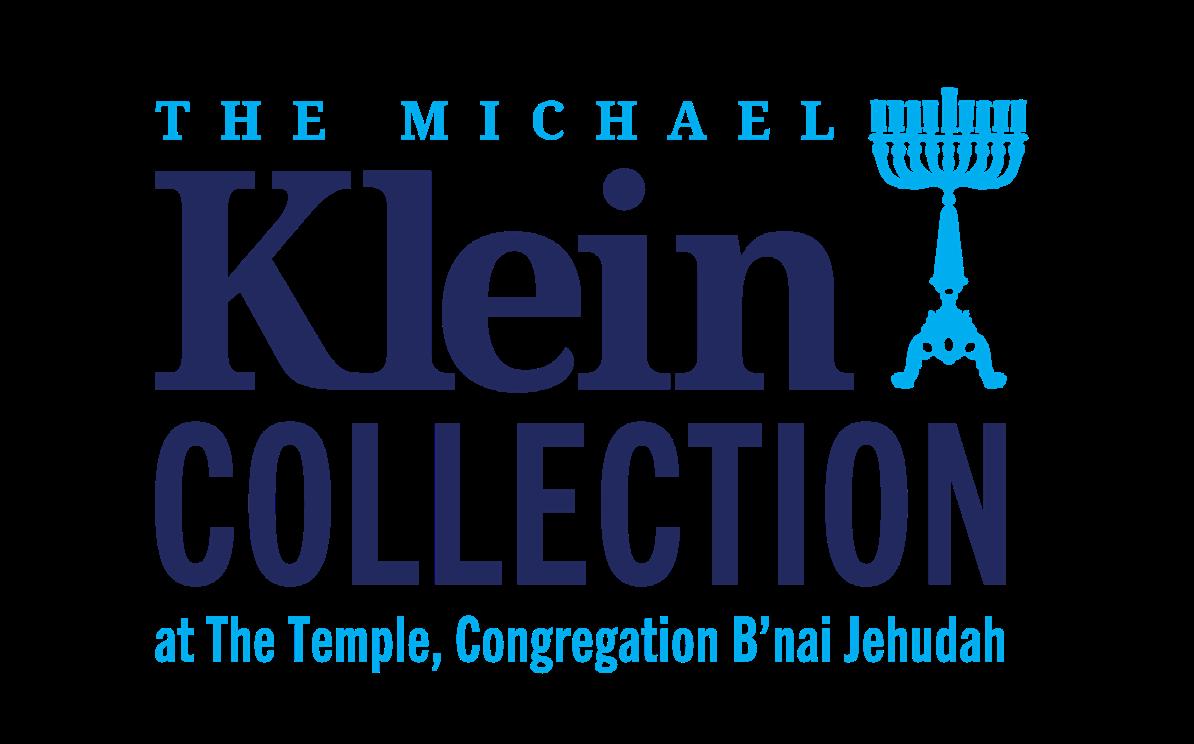
By Ellie Holsten
Jewish amulets are often made to guard against one of the most feared creatures in Jewish mythology: the demon Lilith, known for killing expectant mothers and newborn babies. For hundreds of years she was a source of terror to families, but in the 1960s and 1970s, the character of Lilith began to be seen by some as a positive figure and a symbol of women’s independence.
The word “lilith” is used in the book of Isaiah to refer to a demon, but the personified idea of Lilith first appeared much later in a work of midrash likely dating to around 1000 C.E. In this story, Lilith is the first wife of Adam, and like Adam, she is created from
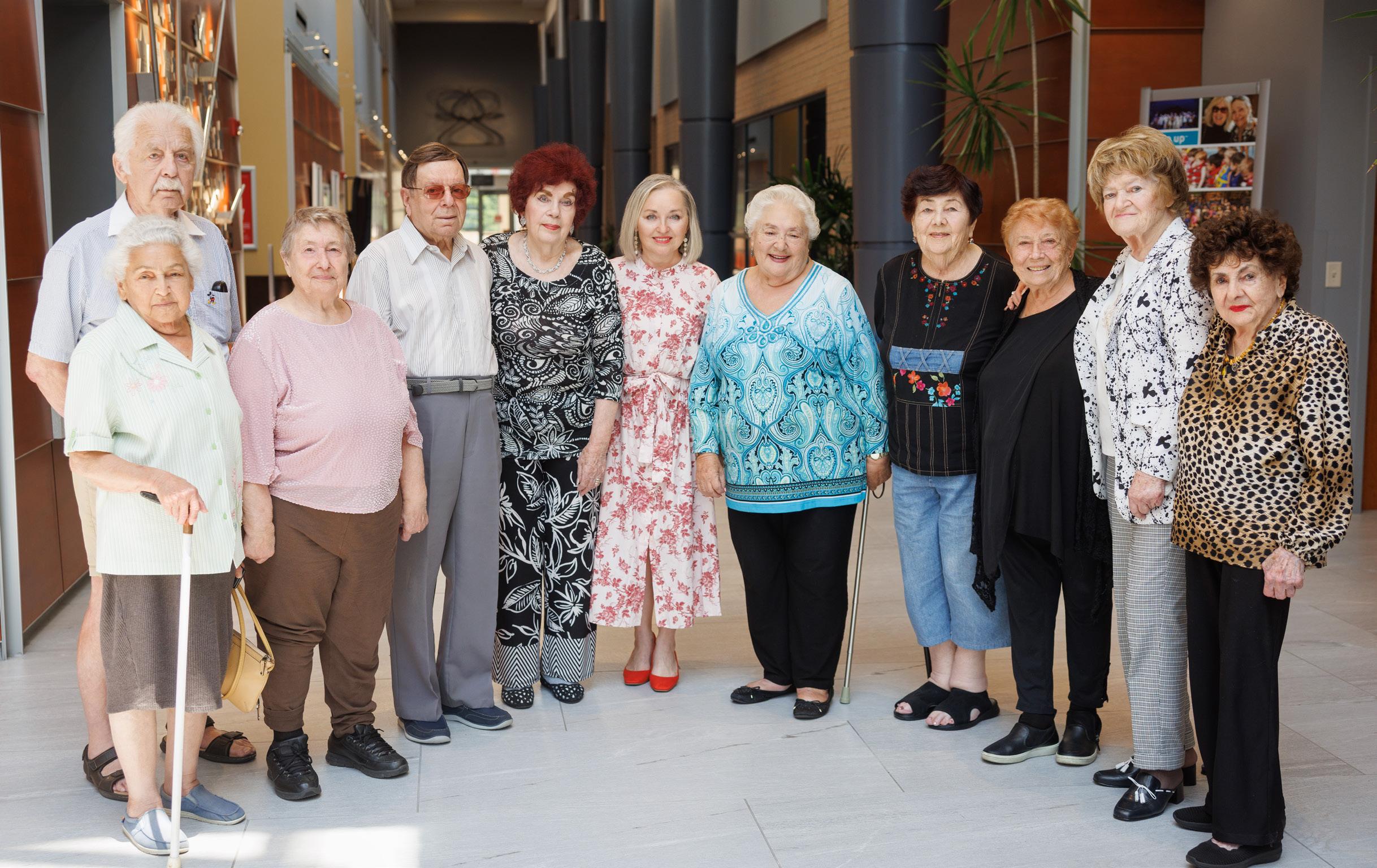
sang to survivors and each offered a white rose to a survivor.
Svetlana Yeager, originally from Russia, translated the program in both Russian and English. MCHE shared a slideshow of survivors rebuilding their lives after the war. Rabbi Jonathan
Rudnick, Jewish Community Chaplain, closed the day with uplifting words.
Before heading home, each survivor received a small gift bag including a “Stand Up to Jewish Hate” pin, information for Holocaust Survivor

dust. Lilith believes that this makes her equal to him, but Adam and God say she should be subservient to him. Instead of submitting to the will of her perceived equal, Lilith leaves the garden. She is caught by three angels who tell her she must go back to the garden and live under Adam, threatening her future children. Lilith refuses to return and takes revenge for losing her children on all mothers, targeting them in pregnancy and childbirth and killing or stealing their babies.
The amulets made to guard against Lilith often have the names of the
angels who captured her. On this parchment amulet from early 20thcentury Egypt, three of the strange shapes represent those angels.
More information about the Michael Klein Collection at the Temple, Congregation B’nai Jehudah can be found at kleincollection.org or by calling (913) 663-4050 to schedule a tour.
The Kansas City Jewish Chronicle and the Klein Collection are partneringtoshareandhighlightsomeofthe collection’suniquepieces.
resources and cake from Nothing Bundt Cakes.
The day came together thanks to JFS Director of Social Work Programming Jana Fielder.
“It was a day of love, gratitude and remembrance — a celebration of life and legacy that we will always carry in our hearts,” Fiedler said.
Jewish Vocational Service (JVS) is one of 37 nonprofit organizations selected to receive a grant from the Ewing Marion Kauffman Foundation. The grants for all recipients, intended for bolstering organizations’ internal operations and sustainability, add up to $8.5 million.
According to the Kauffman Foundation, its Capacity Building grants “look for opportunities to support an organization’s focus on internal effectiveness and long-term stability. These one-time, short-term grants will be awarded to charities that demonstrate a specific capacity gap and who are aligned with our strategic priorities and focus areas.”
JVS’ grant is aimed specifically to support a workforce and career development proposal to strengthen its capacity, according to the Foundation. It also underlines the organization’s employment services such as skill assessment, barrier removal, job searching and placement.
This announcement comes as JVS is in the midst of its Emergency Support Campaign to help fund the settlement of more than 100 immigrant families. JVS’ federal funds were eliminated earlier this year, and the organization aims to raise $500,000 for food, housing and utilities for more than 250 individuals. There is now a pledge match of $27,000.
JVS also is planning a fundraiser at 7 p.m. on July 25 at Hamburger Mary’s. More information about JVS is available at jvskc.org.
continued from page 1
“We want the students and everyone coming to the games to feel like they’re looking at Baby Jay instead of a student in a suit dancing around. It’s a big enough personality and character that it is an exciting role you get to be very creative with,” Kricsfeld said.
Wearing the Baby Jay suit is also difficult — it weighs nearly 30 pounds, is poorly ventilated and has limited outward visibility. For these reasons (and crowd control purposes), Baby Jay has another member of KU’s Spirit Squad accompanying them at all times. When another teammate would be in the Baby Jay suit, Kricsfeld would sometimes be the “bodyguard,” making sure that Baby Jay avoided problems like tripping on stairs, running into people, overheating or being harassed by unruly fans.
Kricsfeld’s Baby Jay engagements ranged from high-stakes Jayhawk basketball games in KU’s Allen Fieldhouse to celebrations such as weddings and
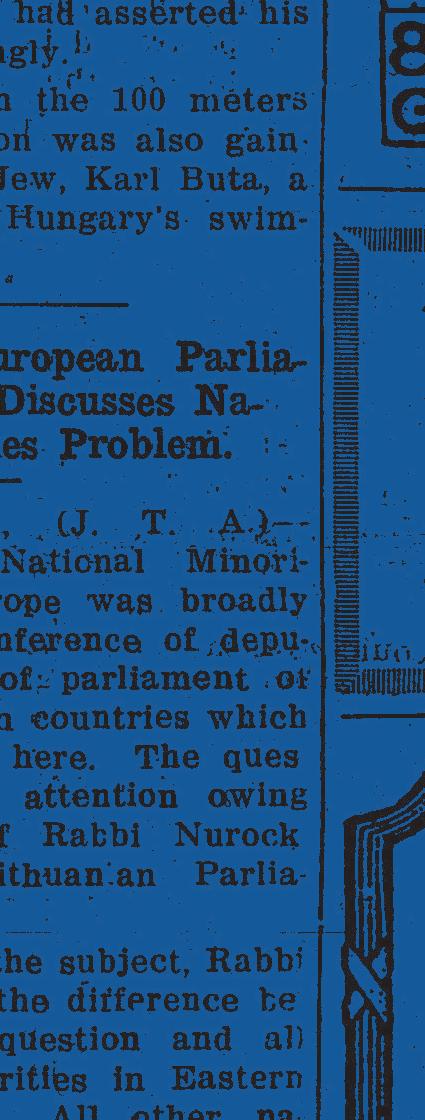


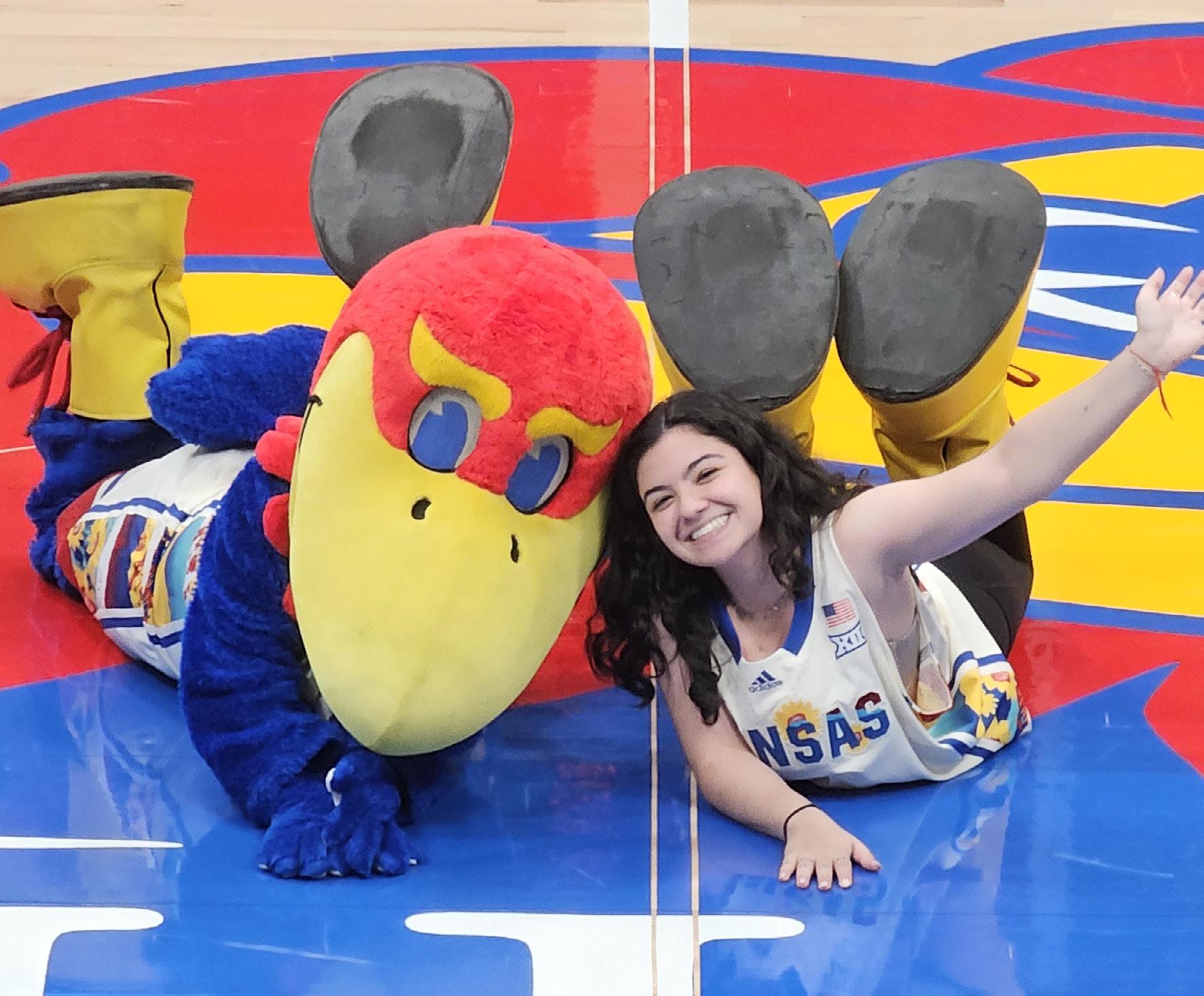
b’nai mitzvah — she even put a kippah on Baby Jay at a bar mitzvah last year. She has also traveled across the country for mascot camps and for KU media opportunities.
During her college years, Kricsfeld was also involved with KU Hillel, KU Chabad and, most recently, Students Supporting Israel, a grassroots organization created to share information about Israel and what life is like there. Overall, she said her experiences as a Jewish student at KU were very positive and helped her become closer with her Judaism. But when Oct. 7 took place, followed by anti-Israel encampments on KU’s campus, she knew it was time to take action.
It began with joining in the counterprotests to the encampments to show the strength of the Jewish community in Lawrence and at KU.
“Then we quickly realized, if we come back every day, we’re just going to be shouting at each other, and it’s just going to be unproductive. It’s going to be a mini proxy war. So everyone agreed to let them do their thing… whether it was accurate or not,” Kricsfeld said.
these awareness events was handing out bagels and cream cheese with signs that said “Spread Schmear, Not Hate.”
“We were giving [bagels] out to students and offering to have conversations about what’s happening in Israel. All we were doing was spreading love and cream cheese. Some of the other clubs, like the Students for Justice in Palestine, took more severe approaches to protest what they were believing, so we tried to keep it lighthearted and friendly, and I think it went over really well,” Kricsfeld said.
So well, in fact, that when KU’s student government presented a bill to label Israel’s actions as genocide, a non-Jewish student government leader defended Israel at a student senate hearing. As exciting as it was to witness the results of their friend-raising events, Students Supporting Israel were ultimately disappointed when the bill was passed in spite of the group’s efforts to demonstrate that Israel has the right to defend itself against terrorism — and that KU student government was the wrong place to make such a declaration.
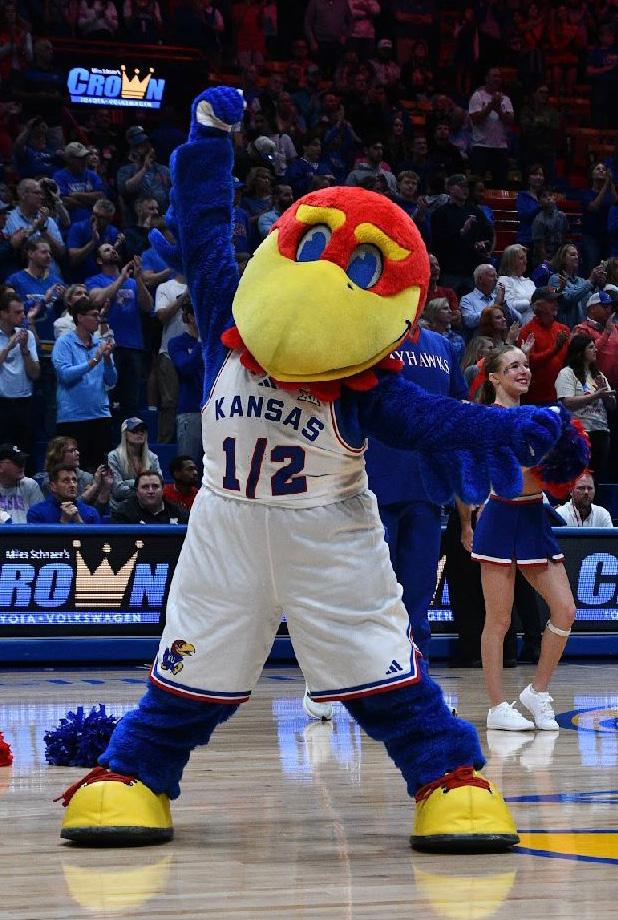
in, that’s what’s important.”
Kricsfeld points out that the Baby Jay coaching staff and spirit squad director were understanding of her Jewish life on campus. In addition to making accommodations for missing practices for Jewish holidays and the Oct. 7 vigil, they checked in on Kricsfeld after the war to make sure she was doing alright.
“I never felt scared to be loud and proud about my Judaism. I always kept my Star of David necklace on and occasionally would wear shirts with Hebrew on it, and no one ever said anything,” she said. “So overall, it was a positive experience. I think coming together after the war ended up being something really special despite the circumstances; it brought the [Jewish] community a lot closer.”
She also said more students than expected attended the vigil after Oct. 7, which was supported by all of the Jewish organizations on campus. She said it as a nice way to bring people together in their mourning. Yet the event provided something even more powerful for Kricsfeld.
After that, Students Supporting Israel put their efforts into sharing facts, debunking myths and making themselves available to answer questions about Israel around campus. The group held monthly awareness events, including tabling at Wescoe Beach – a central gathering spot on KU’s campus – on 9/11 to help others understand that Oct. 7 was Israel’s equivalent. One of Kricsfeld’s proudest moments from
“Technically, student government believes that Israel is committing a genocide, but we showed up at those hearings and we had support from Hillel and Chabad,” Kricsfeld said. “We spoke what we believed, and we left the meetings dancing and singing. So it was conflicting, but I think Hillel and Chabad did the most amazing job bringing our spirits up and making us realize that people are always going to think bad things, and as long as you’re happy and you know what you believe
“[It] also reminded us that through our unity, we become stronger,” she said, “and that’s the only way we’re going to be able to make it through all of this, mentally and physically.”
Kricsfeld will move from her home in Omaha, Nebraska, to Overland Park, Kansas, in August, having recently accepted a job at Hyman Brand Hebrew Academy.
Editor’s note: Chronicle Editor Sam Kricsfeld, Rachel Kricsfeld’s brother, was not involved in the interviewing for this article. Get yourself, your family and your friends subscriptions to The Chronicle! Scan the QR code below or go to kcjc. com/subscribe for more information.

Using The Chronicle’s archives and community submissions, here are some recipes for you to try out. Email samk@ jewishkc.org with a recipe, and it might be published here!
“Mom’s Best Recipes,” by Betty Kalikow
Ingredients
• 2 cakes yeast
• 1/3 cup warm water
• 1 tsp. sugar
• 6 cups flour
• 1 tsp. salt
• ¾ cup sugar
• 1 cup milk
• 1 cup butter
• 6 beaten eggs
• ½ cup raisins (optional)
Instructions
1. Dissolve yeast in the warm water with 1 tsp. sugar added; let cool
2. Into a bowl sift flour and salt.
3. Make a well in the center of the flour; sprinkle ¾ cup sugar along edge of the flour
4. Add dissolved yeast in the center
5. Boil the milk and butter together; let cool, then add to mix
6. Add eggs (and optional raisins)
7. Knead dough together; add flour if needed to make soft pliable dough
8. Place dough in a bowl, cover and let rise
9. When it doubles, punch it down and allow it to rise again
10. Set oven to 350 degrees
11. Cut dough into 1-inch slices and bake in a cupcake pan for 25 minutes
“Mom’s Best Recipes,” by Betty Kalikow
Ingredients
• 2 eggs
• ½ cup sugar
• ¼ tsp. salt
• 2 cups scalded milk
• 2 cups cooked rice
• ½ cup raisins (optional)
Instructions
1. Set oven to 350 degrees
2. Beat eggs and sugar
3. Add scalded milk, salt, rice and optional raisins
4. Mix well, then pour in 6 ½ inch casserole dish
5. Let set in pan of water
6. Sprinkle with nutmeg and bake for 1 hour and 15 minutes
Editorials express the view of the writer and are not necessarily representative of the views of The
By Alexis Greenberg

A friend wants to meet before work to catch up and chat — time to drop $15 on café breakfast and a coffee. You and your college roommates want to create original art for your apartment — $40 down the drain for canvases, brushes, paint and more. An acquaintance wants to pick your brain about her job hunt over lunch — $20 for a mediocre salad, gone.
Sound familiar? Well, I believe life doesn’t need to be this way. Actually, I would go so far as to say, life shouldn’t be this way.
Friendships have gotten so expensive. From bachelorette parties to birthday gifts, monthly dinners to concert tickets, the costs add up.
According to a USA Today article, GenZ is spending $433 a month on friendships. That’s absurd! Do you know how many digital subscriptions to the Kansas City Jewish Chronicle you could buy with that? Twelve. And you’d still have some left over.
Recently, I re-entered our Kansas City Jewish community as a young professional. I’ve lived here my entire life, but found my community through youth groups and religious
organizations. From Jr. NCSY as a middle-schooler to KU Chabad and KU Hillel as a college student, my Jewish community has been handed to me on a free, pre-planned silver platter.
Making new friends as an adult just isn’t as simple. I’m all for hosting big gatherings of friends and friend-inlaws (my term for friends-of-friends) to make new connections, but it takes time, money, energy, and most importantly, planning skills.
Jewish Federation’s Young Adults Division (YAD) is a great resource for meeting new friendly faces to connect with, as are Jewish Experiences KC events, and hanging around your local synagogue of choice. Taking advantage of these groups is a great way to meet new people — but there’s just something about a home-hosted social event that can’t be beat.
Here’s a list of not-expensive events, gatherings and connection opportunities I’ve held recently, or ideas I’ve had, in an attempt to create a new kind of community — one that doesn’t break the bank.
• Dinner and board games after the work day — everyone grabs a dish or side, everyone brings a favorite game.
• Free outdoor concerts and movies — Though the KC Symphony’s Mobile Music Box season is over, The Legends, Nelson-Atkins and Leawood’s Park Place have outdoor movies
through September or October.
• You don’t always need to send flowers or chocolates to a friend going through a hard time — There’s nothing a handwritten letter can’t say. Seventy-eight cents for a stamp and you’re golden.
• Chat, study, work or do passion projects together at Capital One Cafe — Free handcrafted beverages every Monday of baseball season. Nobody needs to prepare their house for guests or anything.
• Go for a walk or sit together at a park — once it’s not quite so hot out. Bring some cut up fruit (watermelons are only $5) and water and enjoy.
• Kill some time with one of Kansas City’s free museums — The Money Museum is a personal favorite of mine.
• Go to an event at a library — The Kansas City Public Library and Johnson County Library have so many options, including an upcoming author talk with Misty L. Heggeness, a KU professor who wrote a book about the economics of Taylor Swift.
It can be daunting to invite new people and make new friends, but start with inviting people you know and encourage them to bring friend-in-laws. Happy community building!
Alexis Greenberg is a recent University of Kansas graduate and Jewish Federation of Greater Kansas City’s digitalmarketingspecialist.
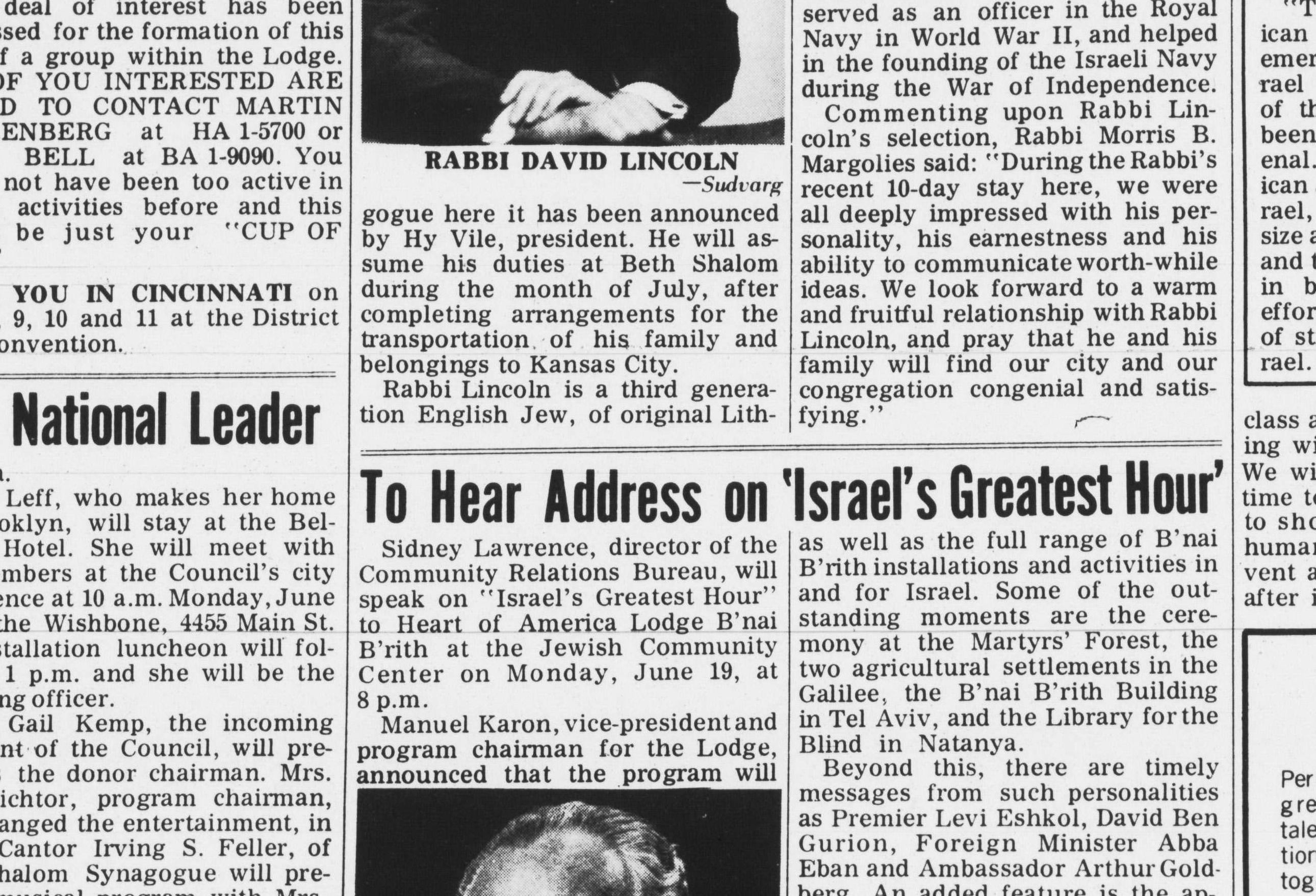



























“What’s
By Lindsey Lipsky Sasone Director

When I was growing up, my mom used to tell me that her mother — my grandmother — would wake her up every morning with the same question: “What do you want for dinner?”
As a teenager, this thought was incredulous. Thinking about dinner? At 7 a.m.? Was she okay?
(Spoiler alert: she wasn’t. She was a Holocaust survivor, and dinner planning was probably her way of creating some sense in a senseless world. Cooking as a remedy to deep trauma, perhaps?)
At the time, I figured it was just a weird 1950s thing. They had one car; she probably needed to know what to buy before her ride left for the day. It didn’t mean much to me back then.
Now, as a mother of three, dinner thoughts consume my mind way more than I would care to admit.
It’s not just a meal — it’s a relentless daily decision that returns each night like some kind of culinary Groundhog Day.
“What’s for dinner?”
“What’s for dinner?”
“What’s for dinner?”
I hear it in my sleep.
Some days, I’m an all-star. I’ve shopped at no less than three different grocery stores and bought ingredients to follow an actual recipe. I feel prepared and empowered. I know what’s for dinner, and it feels like a small miracle.
Other days? I open the fridge at 4:37 p.m. and fumble through the freezer, begging for something the kids might actually consume. The twins are running laps in the living room. Someone’s squeezing

the cat too tight again. I hear a tussle, then crying.
My (loving, well-meaning) husband calls and asks, “Hey, what’s for dinner?”
It is then a tiny piece of me dies. And yet, somehow, we always eat.
It might be a fully planned and prepped meal that would make Martha Stewart proud. Or it might be butter noodles. But we eat, we connect. At the end of the day we are safe, together.
And when I think back to my grandmother, I understand her question in a whole new way. She wasn’t just planning meals. She was offering something much deeper: a promise that her family would be fed, that there would be a table to gather around, that life could be a little predictable — even when the world had once been anything but.
Dinner isn’t just about food. It’s about presence. It’s about rhythm. It’s about the thousands of small, invisible ways we say, “I’m here. I’ve got you.”
In Jewish homes, we center so much around the table — holidays, milestones, rituals. But the weekday dinners, the Tuesday nights with mac and cheese for the second night in a row, someone refusing to eat, only to ask for a snack hours later — those matter too.
So when I hear, “What’s for dinner?” for the fourth time this week, when I feel that little eye twitch start to form, I will try (really, try) to remember what it means. That somehow, in answering this question, we are holding together the tiniest piece of order in a loud and often messy world. That, at the end of the day, our family is fed and safe. My grandmother would be proud. And if not? There’s always cereal for dinner.



Yikes. It looks like I’m well on my way to becoming Honi. Who, you ask, is that? The Talmudic version of Rip Van Winkle, Honi took himself a nice, long, 70-year nap. Upon awakening, he wiped his eyes, stood up and moseyed over to his former house of study. There, to his great disappointment, he discovered that no one recognized him anymore. What’s worse, he learned that all his friends had died. So bereft was he at this news, he refused to go on, inspiring an oft-repeated Talmudic saying, “Either companionship or death.”
I’m not quite ready to call it quits. But like Honi, I understand the profound pain of losing friends. Even though I’m “only” 72 years old (young in my social circle), I’ve already lost three dear friends. When I told one still-living friend about this, she said, “Me, too. And two who are still around ain’t looking so good.”
At this rate, I’ll soon be attending more funerals than birthday parties. Or like my mom, who in her latter years was going to two burials a day. Just like Honi, I see a friendless existence in my future, unless I do something about it.
I resolve to “take agency,” that corporate-sounding buzzword that means taking action to gain a sense of control. No matter how much I hock my friends about diet and exercise, I can’t stop them from dying, so I’ll take the next available route. I’ll make younger friends.
I hereby announce that I am seeking candidates to be my new, younger friends. Interested applicants must be 50 years old or younger and have exceptional longevity in their genes. By the way, Jews have an advantage in this regard. As reported in the Forward, a British study found that Jews live an average of five to six years longer than their gentile counterparts.
Speaking of life expectancy, these potential pals must be in good health, yet willing to listen to my own “organ recital,” the litany
about my failing body parts. Since my eyes are already going, these young people must be able to drive at night. We’ll attend Friday night services occasionally and go out to eat often. Beware, however. I don’t like sushi, so those places are out. And be prepared to pick me up at 5 p.m. so we can catch both happy hour and the early bird special. Better yet, let’s make it 4:30 p.m.
Speaking of late night, they must remember to never call me after 9 p.m. Or to be safe, let’s make that 8:30 p.m.
These young friends must also be technologically savvy, or at least knowledgeable enough to help me post pictures on Facebook. They must be able to decipher unrecognizable text message abbreviations. So far, I’ve been able to figure out that “JLMK” stands for “Just Let Me Know” and “IMO” means “In My Opinion.” But I thought “AKA” meant “Alta KAker” (old person), not “Also Known As.”
What, you may be wondering, would a younger companion get out of our relationship? Dearest young person, I promise to share with you the lessons I have learned over my decades of life. Of course, I have yet to find any young person who wants to hear any wisdom or advice. Or, as my daughter admitted to me recently, will come to appreciate my words only after they have been ignored.
Perhaps the most valuable benefit to our friendship will be the example I set growing old gracefully. And learning to make younger friends will come in handy when their friends start dropping and they home into becoming Honi themselves.
Nancy Kalikow Maxwell is a Kansas City native and awardwinning author. Her latest book, “Typically Jewish,” is available through the Jewish Publication Society or Amazon. Her website is kaliwellinc.com and email is nancykalikowmaxwell@gmail. com.
The Jewish Federation is committed to building a strong, joyful, and meaningful Jewish life — and we know that safety is essential for Jewish life to thrive in Kansas City. In response to the recent attacks on Jewish communal events in Washington, D.C., and Boulder, Colorado, and the growing incitement against Jews nationwide, Federation Board Chair Sondra Friedman and I joined leaders from 100 Jewish communities in Washington, D.C. last week, to make an urgent case to Congress and the Administration for increased security.
We advocated for:
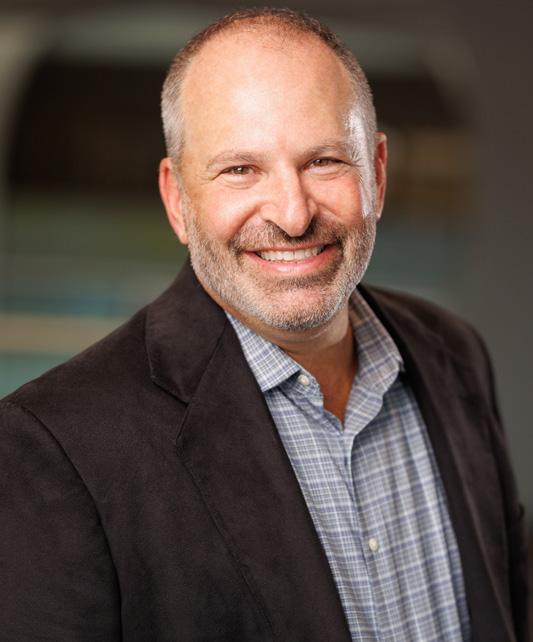
interviewing Bob and Nancy Milgrim from their home in Prairie Village. When I asked Bob what message he wanted leaders to carry to Capitol Hill, he said: “Had there been more security at the event where Sarah and Yaron were killed, she would still be alive today.”
• Increased funding for the Nonprofit Security Grant Program
• Support to offset rising private security costs
• Enhanced local law enforcement resources
• Greater federal capacity to combat domestic terror
• Stronger laws and enforcement against online incitement
• Full prosecution of hate crimes
cause of our tragic loss of Sarah Milgrim and past attacks on our institutions, I was invited to open the conference by
Sondra and I were also invited by William Daroff, CEO of the Conference of Presidents of Major American Jewish Organizations, to join a small group of leaders for a meeting with Jacob Reses, chief of staff to Vice President Vance. From the Eisenhower Executive Office Building, I shared what we’re doing in Kansas City to keep our community safe — and emphasized the urgent need for greater federal support. From our Jewish Community Campus to synagogues, schools, summer camps, and public events, rising antisemitism is forcing us to take extraordinary measures to protect Jewish life.
I am incredibly proud of the security infrastructure we’ve built in Kansas City — the partnerships with law enforcement, the strength of our community, and the tireless efforts of our security team. But there is still much more to do.

The safety and security of our community will always be our top priority. We remain committed to strengthen-



Steven Dolginoff
Beloved father, son, brother, uncle and friend Steven Dolginoff passed away on July 6 at the age of 70.

Born in Kansas City on March 11, 1955, to Wesley and Marna Dolginoff, Steve grew up with a spirit of adventure and deep sense of connection to the Jewish community. He especially enjoyed and looked forward to the family holiday traditions and weekly Shabbat dinners. As a proud Boy Scout, he had the extraordinary opportunity to travel the world with a Jewish scout troop from Pennsylvania. Beginning with the International Boy Scout Jamboree in Israel, they then traveled to Italy, France and England — experiences that shaped his love for food from all around the world.
Steve attended the University of Missouri (Mizzou), where he joined the AEPi fraternity and met the men who would become his lifelong brothers.
After Mizzou, Steve earned a degree in hotel and restaurant management and then began his professional life in St. Louis, working in restaurants and beginning what would become a lifelong love for preparing food. Eventually, he returned to his hometown of Kansas City, where he found his true calling in hospitality. Steve began working at the Muehlebach Hotel as the food and drink manager. As the food service manager at the Alameda Plaza Hotel (now the InterContinental) and later overseeing the kosher kitchen at Menorah Medical Center, Steve brought creativity and joy to every dish he touched. He was never happier than when in the kitchen and feeding others or looking through his vast collection of cookbooks for new recipes.
When his nieces Jamie and Becky were young, Steve made sure that they were able to go out for Halloween when their dad was unavailable. He always made sure he had plenty of snacks and treats on hand for when his great-nieces and nephews were visiting, and they never went home empty handed.
But of all his accomplishments, nothing brought him more joy than being a father. His daughter, Hannah, was the light of his life, his proudest role and his most treasured legacy. Steven was preceded in death by his parents, Wesley and Marna. He
leaves behind his cherished daughter, Hannah; his devoted sister, Donna Katz (Dr. Dennis); adoring nieces Jamie Katz (Brady Warshawsky) and Becky Klinkenborg (Joe); and great-nieces and nephews Jacoby and Weslyn Warshawsky and Alex, Maya and Olivia Klinkenborg, who will carry his memory with them always.
In lieu of flowers, please consider a donation to the American Diabetes Association or charity of one’s choice. Online condolences for the family may be left at louismemorialchapel. com.
Las Cruces, New Mexico (2011-2020). He retired from his position at Temple Beth-El on June 30, 2020, becoming rabbi emeritus of the congregation upon his retirement.
During his congregational rabbinate, Rabbi Karol focused on Jewish education, innovative worship, interreligious and multicultural programs and Jewish musical creativity. He wrote often for the local press, including a monthly column for a weekly newspaper in Las Cruces. He also released three albums of original Jewish music in 2003, 2005 and 2014. Those who would like to explore Rabbi Karol’s original compositions and writings can find them on his website, larrykarol.com.
spirit was a gift to so very many. He was deeply committed and dedicated to his congregational homes, and to the Jewish people.
Larry was a wonderful husband to Rhonda, his wife of 42 years; a doting, proud father to his son, Adam (Rabbi Juliana Schnur Karol); an adoring grandfather of two amazing grandchildren, Joshua and Eva; a loving brother to Rabbi Stephen A. Karol (Donna Karol); a cherished uncle to Samantha Tananbaum (Robert Tananbaum) and great-uncle to their son, Seth; a treasured cousin to so very many. They and Rabbi Karol’s other relatives and friends will miss him dearly. He was preceded in death by Joseph in 2002 and Ruth in 2004.

Rabbi Lawrence “Larry” Karol, 70, of Overland Park, Kansas, died on July 5. Funeral services were held on Wednesday, July 9, at The Temple, Congregation B’nai Jehudah (12320 Nall Avenue, Overland Park, KS). Graveside service to follow at Rose Hill Cemetery (6900 Troost Avenue, Kansas City, MO). Shiva was held at the Temple at 6 p.m. on Wednesday, July 9.
Larry was born on Oct. 3, 1954, to two loving parents, Joseph and Ruth, in Kansas City, Missouri. He and his older brother, Stephen, were raised in Kansas City. The family was active for many years at The Temple, Congregation B’nai Jehudah, where Larry became a bar mitzvah and was confirmed, and was active in the Temple Youth Group. As a child, he loved baseball, music, Cub Scouts, the junior choir at the Temple and listening to WHB Radio.
Larry graduated from Center High School in 1972. He went on to study at the University of Illinois in Champaign-Urbana, completing his bachelor’s degree in 1976. Rabbi Karol was ordained as a rabbi at Hebrew Union College-Jewish Institute of Religion in Cincinnati, Ohio, on June 6, 1981. In his first year at HUC-JIR, he was awarded the Herman Snyder Alumni Award for Academic Excellence. He received an honorary Doctor of Divinity Degree from HUC-JIR in 2006. Rabbi Karol served at Temple Israel in Dayton, Ohio (assistant rabbi from 1981-1984); Temple Beth Sholom in Topeka, Kansas (1984-2006); Temple Israel of Dover, New Hampshire (2006-2011); and Temple Beth-El in
Rabbi Karol was steadfastly devoted to Holocaust remembrance, shaping moving memorial services and educational programs throughout his rabbinate. Through his work on the Kansas State Holocaust Commission (Chair: 1995-2006; Member: 1987-2006, 2024-2025) he ensured that the stories of survivors and the lessons of history would never be forgotten.
During his long career, Rabbi Karol was the recipient of numerous awards and recognitions, including the Local Award of the Brown Foundation for Educational Equity, Excellence and Research (Topeka, Kansas; 1994), the Dr. Martin Luther King, Jr. Civil Rights Award (Topeka, Kansas; 1991), a Community Service Award from the JCRB-AJC of Greater Kansas City (1997), and the Wentworth-Douglass Hospital Spiritual Care Award (Dover, New Hampshire; 2010). June 25, 2020, was declared “Rabbi Larry Karol Day” in Las Cruces.
He also served on numerous commissions, committees and boards during his rabbinate; to name but a select few of which he was particularly proud: The Brown Foundation for Educational Equity, Excellence and Research (board member, secretary: 1988-1996), the New Mexico State University Interfaith Council (member, president, executive advisor: 20112025), and Interfaith of Topeka (program chair, vice president, president: 1986-2003).
In lieu of flowers, the family suggests contributions be made to The Temple, Congregation B’nai Jehudah, or a charity of your choice.
Frank Thomas “Tom” Lewinsohn
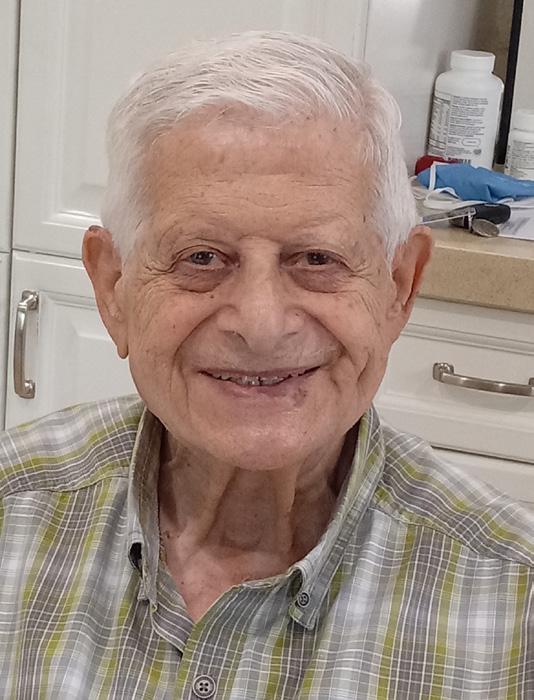
Tom Lewinsohn, 94, of Overland Park, Kansas, died on July 2. Funeral services were held Sunday, July 6. In lieu of flowers, the family suggests contributions to the Midwest Center for Holocaust Education (mchekc.org/giving/gift-of-remembrance) or a charity of your choice.
Frank Thomas Lewinsohn was born on June 16, 1931, to Dr. Hugo M. Lewinsohn and Mathilde (Silberstein) Lewinsohn in Berlin, Germany. The family — including Tom’s older brother, Peter — fled the Nazis in 1941, landing in Shanghai, China, one of the few places accepting Jews at the time. They lived in the Jewish ghetto, and Tom attended a Talmud Torah where, “if you were a good student . . . at the end of the year you got a pair of shoes.”
He completed high school at the age of 16 and then earned money to emigrate to America, learning English by watching movies in Shanghai’s theaters. He emigrated in 1948, arriving in San Francisco when a U.S. Navy sailor he met in Shanghai, Robert Ormsbee, arranged for Tom to come to Robert’s home in Erie, Pennsylvania. Tom earned an American high school diploma there and took college courses
Rabbi Karol’s generous
Rabbi Karol was a much beloved rabbi. He taught with inspiring passion and critical insight; he fostered meaningful, lasting, authentic relationships with his congregants; he engaged his creativity and his communities’ spirits through original music; and he led with moral clarity and a kind heart.
continued on next page
continued from previous page
nearby.
He enlisted in the U.S. Air Force in 1951, trained as a B-26 bombardier, and was stationed at Yokota Air Base in Japan. Tom became a U. S. citizen while serving in the Air Force.
Tom and his brother, who emigrated to America a few years prior, arranged for their parents to come in 1950. Hugo and Mathilde settled in Osawatomie, Kansas, where Hugo became a physician in the town’s psychiatric hospital. Tom was honorably discharged from the Air Force in 1955, and he moved to nearby Lawrence, Kansas, where, at the University of Kansas, he completed undergraduate and graduate degrees specializing in personnel and public administration. He interned with the State of Kansas starting in 1956 and began rising through the personnel administration ranks.
During that time, on a double-date with another couple, he met Alice Hony of Kansas City, then a student at the University of Kansas City (now UMKC). Alice was born in Hilchen-
bach, Germany, and had emigrated to America in 1938, also as a child. The two discovered their shared origins, began speaking German with each other (ignoring their dates) and, having found the loves of their lives, married on Tom’s birthday in 1957.
In 1964 Tom accepted a senior position in Kansas City’s personnel department despite a mentor’s advice that the city was “a political hotbed… that’s full of patronage and… you probably won’t last more than six months there.” Tom skillfully rebuilt the city’s personnel system, however, and his political superiors and professional colleagues soon recognized his integrity, high standards and courage. In 1968, he was appointed Kansas City’s Director of Personnel, a position he held for 29 years. Tom supervised nearly 50 staff members, served over 4,000 city employees and worked with two unions to transform his department into one of America’s best large-city agencies. Peers recognized his achievements by electing him to leadership positions in national professional organizations,
including the presidency of the International Personnel Management Association, and by giving him numerous honors. An award was established in his name to be given annually by the Kansas City chapter of the Public Sector Human Resources Association.
After retiring from Kansas City’s personnel department, Tom assumed a similar role, on a part-time basis, for the city of Prairie Village. Inspired by seminars he led for peers across America and overseas, he also began teaching courses on human resources management, also parttime, at Baker College and the University of Kansas.
Tom was preceded in death by his beloved Alice and dear brother, Peter. He is survived by his children, Rob and Debbie; granddaughter, Anastasias Gregory; great-grandson, Sean Michael Graham; former son-in-law Pete Brown; sister-in-law, Cynthia Lewinsohn; nephews, David and Mark Lewinsohn and their wives and children. They and Tom’s other relatives and friends will miss his sweet
company and the inspiring values gained from his experiences.
Tom endeavored throughout his life and career to, as he said, “enlighten people against bigotry, against hatred… to accept each other as human beings and not based on religion, gender, or race or age. That we need to move forward, and that maybe our children and their children may see a better day.”
Online condolences for the family may be left at louismemorialchapel. com.
Barbara Sachs, 84, of Sherman, Connecticut, passed away unexpectedly on June 29, 2025, in Danbury, Connecticut.
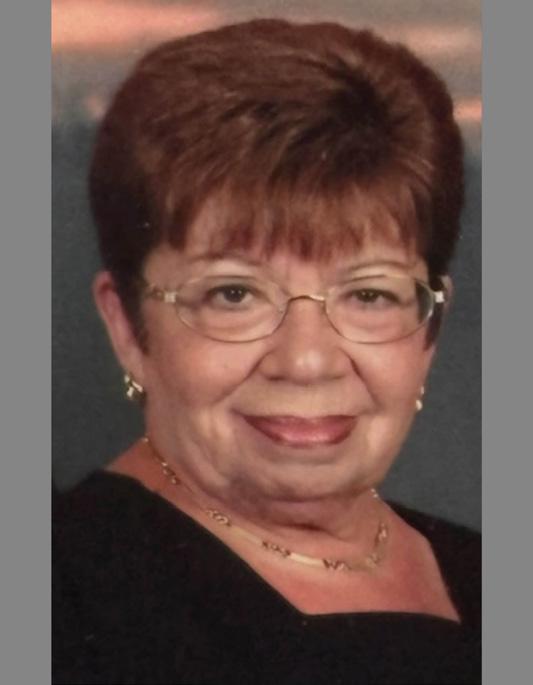
She was born in the Bronx on July 15, 1940, to the late
continued on next page
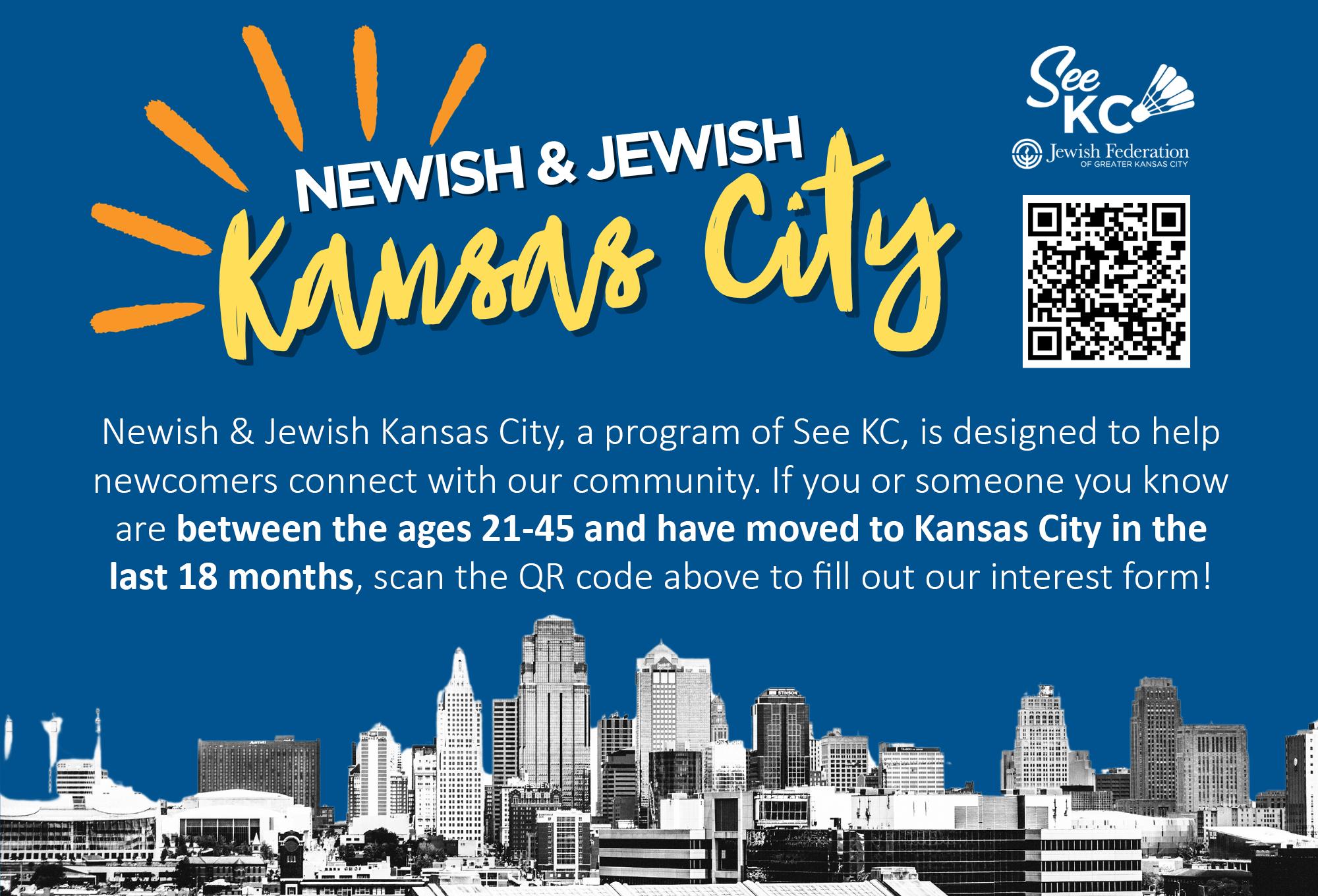
continued from previous page
Louis and Minnie (Wechselfeld) Bernstein, of blessed memory.
Barbara graduated from William Howard Taft High School in the Bronx, New York, in 1958. She had a love for English class and writing; her favorite book was “Anne of Green Gables,” where she would get drawn into the characters.
She met her future husband and love of her life, Marvin, while working in an optometrist’s office during her senior year of high school. Their romance flourished, and they were soon married on Sept. 12, 1959, at Temple Zion, Bronx, New York.
Barbara and Marvin eventually settled in North White Plains, New York, where they raised their two daughters, Debra and Lisa.
Barbara enjoyed playing mahjongg with her neighborhood friends and was involved in various bowling leagues with Marvin. Her love of crafting was evident by her frequently having a hook rug, embroidery, or crocheting project at hand and teach-
ing those skills to her children.
She enjoyed taking family vacations, and, in later years, taking cruises with Marvin and lifelong friends, traveling to the Caribbean and the Panama Canal.
She was a homemaker and Room Mother when her children were growing up, and later worked at Seely Place Elementary, Scarsdale, New York, as an office aide; and as a Social Services examiner for Westchester County in Rye Brook, New York.
In 1989, she relocated to Overland Park, Kansas, when her husband was transferred by his company. Soon after moving, she worked as an office assistant in a law office and later gave up her job to move her mother from Brooklyn to Kansas, taking care of her full time. When Marvin was transferred again, they moved along with her mother to Florida, where they settled in Boynton Beach and reconnected with several childhood and Westchester friends. In 2021, Barbara and Marvin moved to Connecticut to live with their daughter and son-in-law and be close to family.

Barbara, like her mother, was always there for everyone and, in countless ways, put her own needs aside for the needs of others and never complained about it. She would extend herself and never consider it a sacrifice. She was there as a loyal and trusted friend, kind, loving and a devoted wife for 65 years, and a cherished mother, grandmother and great-grandmother. Her warm and welcoming smile and disposition were extended to family, friends and strangers alike.
Barbara was preceded in death by her parents, Louis and Minnie Bernstein, as well as her sister, Eleanor Gelfand. She is survived by her loving husband of 65 years, Marvin, of Sherman, Connecticut; her daughters Debra (Jeff) Martasin of Overland Park, Kansas; Lisa (Anthony) Grioli of Sherman, Connecticut; her granddaughters, Jessica (Thomas) Garofano of W. Cornwall, Connecticut; Alyssa (Michael) Normandin of Morris, Connecticut; and Laura Martasin of Lenexa, Kansas.
She was blessed to have six great-grandchildren whom she loved and adored and was able to spend the past few years getting to know: Thomas, Theo, Jolie and Janie Garofano; and Carter and Levi Normandin. She is also survived by several nieces and nephews, and by the family dog, Sadie, who was the pet she always wanted but was never able to have.
A tribute to her life with a short service will be held on July 27 at the JCC in Sherman for family and friends to share stories and memories. Donations can be made to Hadassah or an organization of your choice.
Patricia Mack Stein, 89, died on July 8 at Menorah Hospital after a short illness. She was born on Aug. 31, 1935, in Neosho Rapids, Kansas,

to Lawrence and Louise McConnaughey Gardner. She graduated from Emporia High School, received a BA in home economics and a master’s degree in nutrition from KU, and a master’s degree in counseling from UMKC. As an undergraduate at KU, she lived in Miller Scholarship Hall, where she formed many enduring and important friendships.
She worked as a registered dietitian and instructor in dietetics at KU Medical Center and later maintained a private nutrition counseling practice. In 1972, Pat married Ira Stein. Until Ira’s death in 2012, they enjoyed their life together, traveling often. Pat started a catalog book company specializing in nutrition books and supplies which she and Ira ran together.
Pat’s husband, Ira, and her sister, Mary Hardy, preceded her in death. She is survived by her nieces, Kathy Ostby (Neil) and Kristen Hattesohl; her nephew, James Hardy (Dana); her stepsons, John Stein (Elizabeth Warner) and Richard Stein (Mary Howe); three grandchildren and seven great-grandchildren. Her beloved cat, Stockings, is being well taken care of in a new home.
Pat was a member of Temple Israel of Greater Kansas City.
Memorial gathering will be set for a later date. Donations may be made in Pat’s honor at Jewish Family Services of Greater Kansas City, where Pat was a volunteer (jfskc.org/donate). Online condolences may be made at louismemorialchapel.com.
Rose Carr stone unveiling
The stone unveiling for Rose Carr will be at 10:30 a.m. on Friday, Aug. 1, at Rose Hill Cemetery (6900 Troost Ave., Kansas City, MO 64131).

Kansas City’s Jewish Funeral Home Over 104 years
Proudly Owned & Operated by the Epstein Family 6830 Troost Ave., Kansas City, MO 64131
